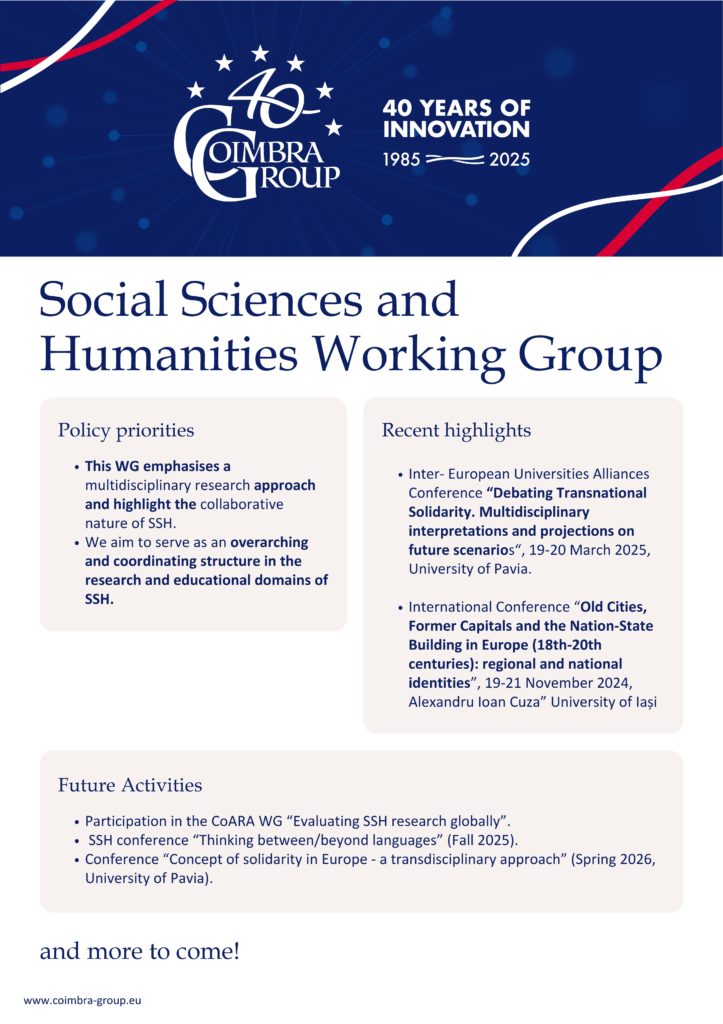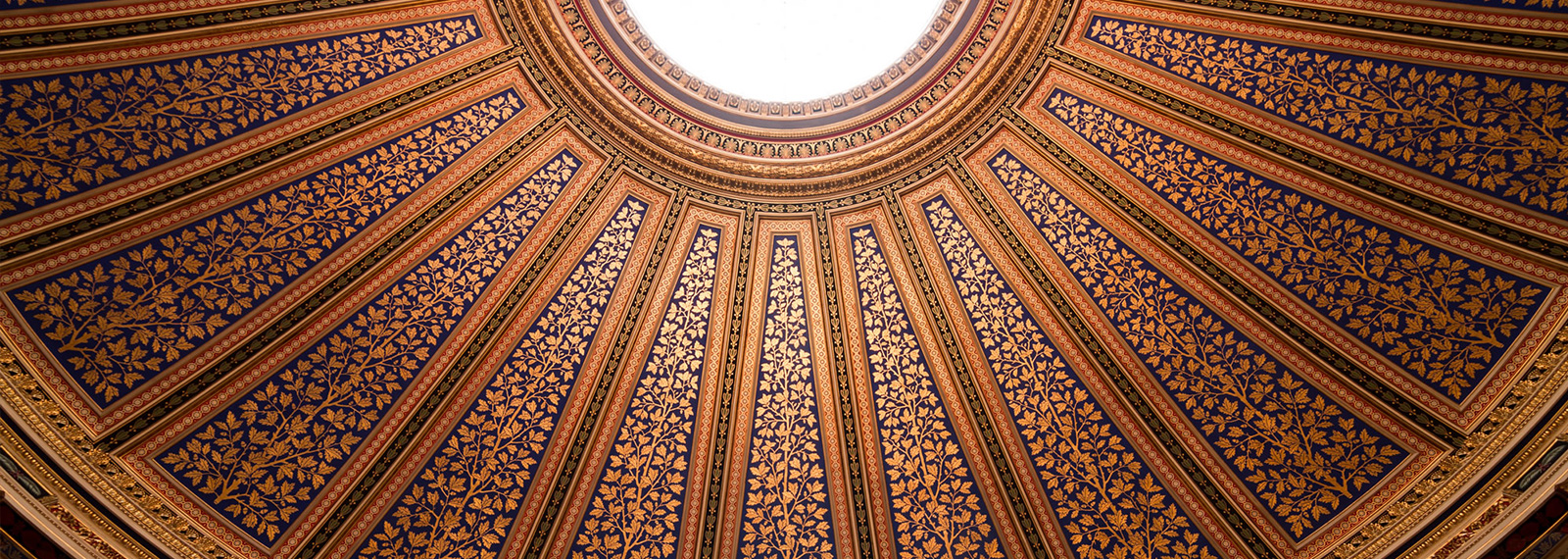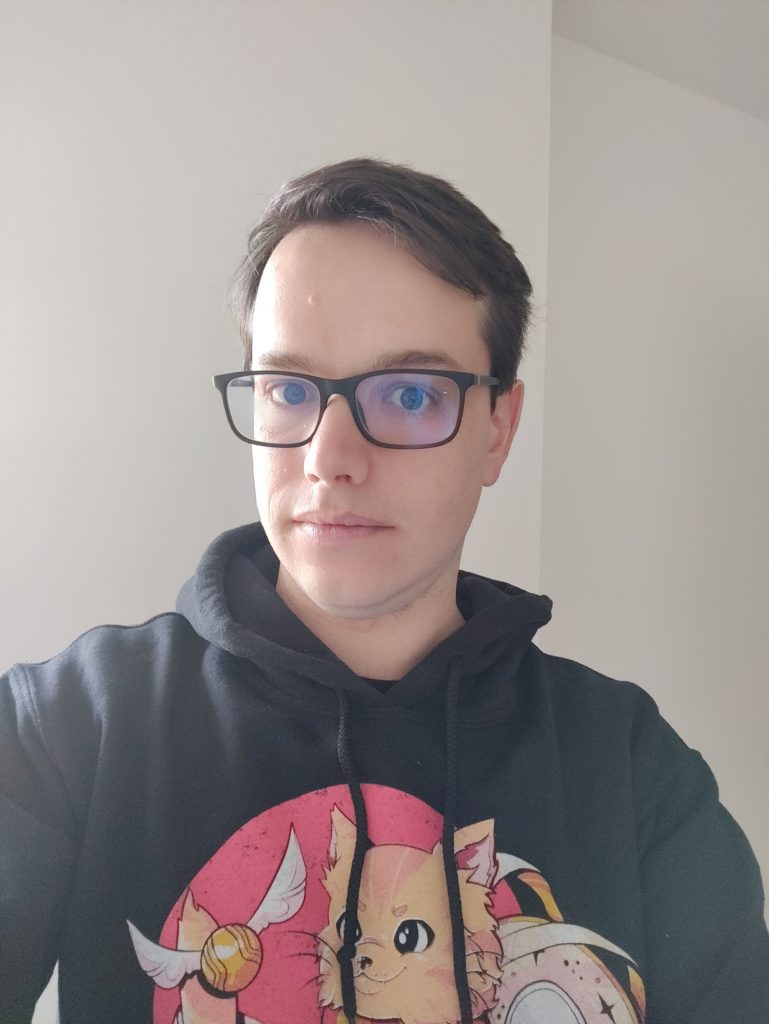Equality & Diversity
Working Group
Chair: Siobán O’Brien Green
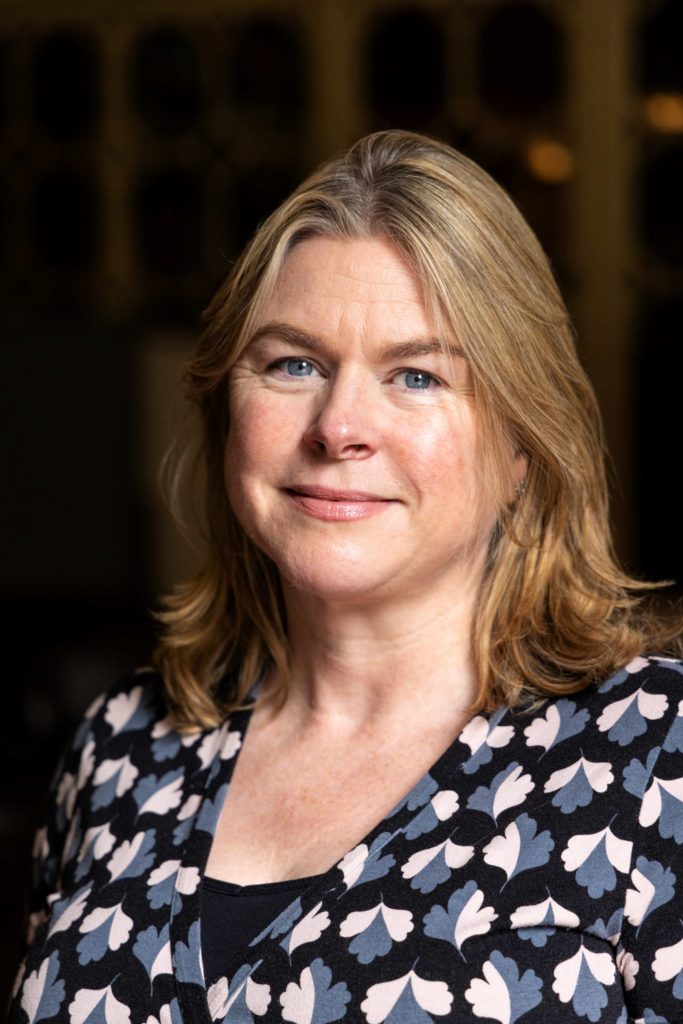
Dr Siobán O’Brien Green works as the Head of Equality, Diversity and Inclusion (EDI), in Trinity College Dublin, the University of Dublin, Ireland. Siobán is responsible for leading and coordinating Trinity’s EDI work areas and Office. Siobán has worked on multiple national and European multi-country gender-based violence (GBV) and equality research projects and has taught, delivered training, published and presented widely on these issues.
Vice-Chair: Iveta Bayerová
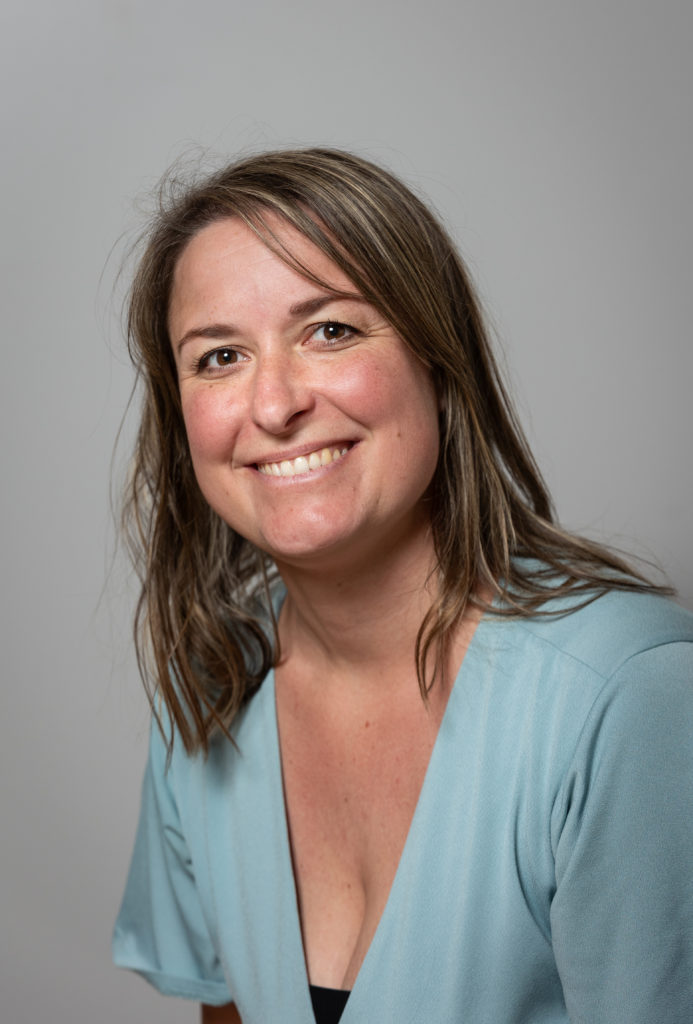
Iveta Bayerová works as the Equal Opportunities Agenda Coordinator at Charles University and as the secretary of its Equal Opportunities Board. She is a Ph.D. candidate in Applied Ethics at the Faculty of Humanities, focusing on care ethics and inclusive gender equality in academia. Her professional background includes work in social services and international youth projects, and collaboration with the Czech Ministry of Labour and Social Affairs. She co-represents the Coimbra Group in the ERA Action 5 Sub-group on Inclusive Gender Equality.
Working Group Focus
The ED WG aims at working with and providing support to CG Universities in the areas of inclusive education and leadership, equality between men and women, diversity and intersectionality.
Equality and inclusion are of crucial importance in facilitating long-term improvement of the quality and excellence in research and innovation, and for that reason, the ED WG continues to focus its primary attention and activities in this direction. As global challenges and threats affect all humanity and answers must be increasingly sought together, equality and diversity become increasingly entangled concepts.
The ED WG’s secondary focus is on promoting the incorporation of equality and diversity into pedagogical practices, collaborative research projects and institutional measures across the CG. In the next 3 years, the ED WG will continue to hold and improve regular WG meetings as an essential mode of sharing good practices and jointly thinking through the Equality, Diversity and Inclusion (EDI) agenda in the CG institutions in international and EU contexts.
The main tasks of the ED WG in the upcoming three years are the following:
- to open up ED WG’s debates and initiatives to all CG universities and the European University Alliances by sharing workshops, webinars and advocacy initiatives on urgent questions of antiracist and antisexist education, as well as collaborative work towards non-discrimination in academia;
- to embrace the challenge of facing and digging into the digital domain, looking at Artificial Intelligence in relations to questions of ethics and social justice;
- to continue serving as an EDI advisory body for the leaderships of our respective universities in the area of diversity, inclusion and intersectional policies and practices;
- to continue participating in the Commission’s sub-group of experts on ‘Inclusive Gender Equality in the European Research Area’ (ERA Policy Agenda Action 5).
Priorities for 2025–2026
- Advocating for academic freedoms and the democratic values of EDI in Europe and in light of current global developments.
- Collaborating with other CG Working Groups to understand and govern the impact of AI on universities, particularly as regards teaching.
- Focus on AI digital domain and social justice.
- Providing input to the European Commission’s consultations on documents and policies concerning EDI in academia, research and innovation.
- Focusing on sexism and racism from an intersectional perspective in all ED WG activities.
Recent highlights since June 2024
- Peer-review workshop for the forthcoming ED WG book “Why EDI Matters – Equ(al)ity, Diversity and Inclusion in European Universities”, 23-24 April, Charles University.
- Webinar “AI Ethics and Governance” with Dr Francesca Rossi, IBM fellow and the IBM AI Ethics Global Leader, 13 March 2025 (link to replay).
- Call for papers “Why EDI Matters: Equ(al)ity, Diversity and Inclusion in European Universities”, December 2024 (link).
Ongoing/forthcoming activities 2025-2026
- Publication of the ED WG collective volume “Why EDI Matters: Equ(al)ity, Diversity and Inclusion in European Universities” [Fall 2025], followed by presentations and dissemination of the volume in and outside the CG community [in Brussels, Spring 2026; at the CG Annual Conference in Granada, June 2026].
- Webinar on “Feminist digital justice”, with guest keynote speaker [Spring 2026].
- Collaboration with CG WGs on the topics of EDI in AI + sharing our collaborative work in the CG community
- Representing the Coimbra Group network in the Subgroup on Inclusive Gender Equality of the European Research Area Forum.
Contact person at the CG Office: Emmanuelle Gardan (gardan@coimbra-group.eu)
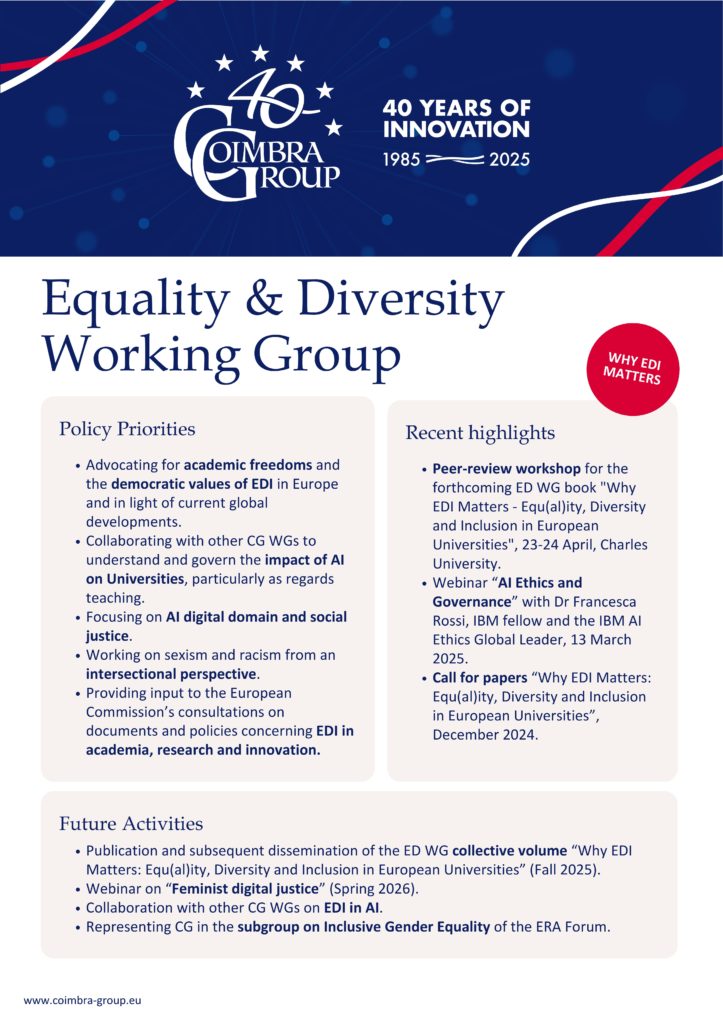
Academic Exchange and Mobility
Working Group
Chair: Chantal Riccardi
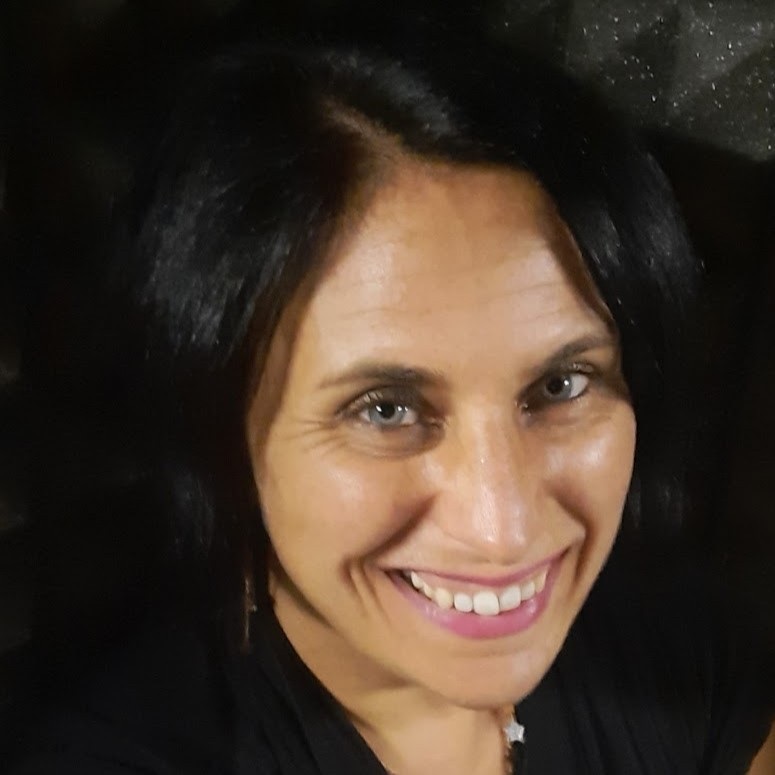
Chantal Riccardi works as International Mobility Officer at the University of Pavia and she has over 17 years of experience in the field of international students mobility. She graduated in Political Sciences (master’s degree in African and Asian Studies) at the University of Pavia. She has been recently involved in the Mobility Task Force and a technical Work Package of the European Alliance EC2U. She is taking part actively in the digitization process of the Erasmus+ Programme being a member of the Erasmus Without Paper (EWP) National Working Groups set up by the National Agency.
Vice-Chair: Daniela Sauge
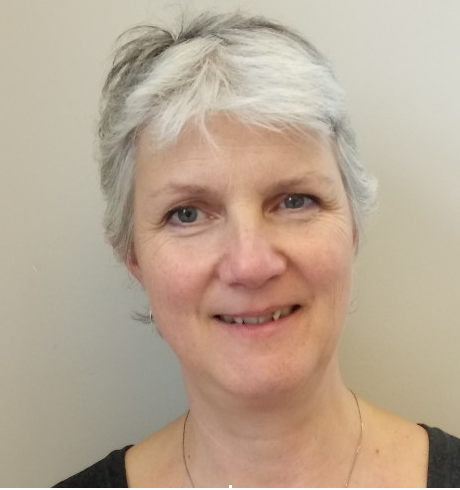
Daniela Sauge is the Head of the Academic Exchange Office of the University of Geneva since 2018. The office actively contributes to the implementation of UNIGE’s international strategy through the setting up of academic exchange, mainly for studying but also for research. It is also responsible for the maintenance and conclusion of collaborations at the European level.
Working Group Focus
The AEM Working Group focuses on staff and student mobility as well as international exchange, addressing a wide range of challenges. These include boosting participation numbers, promoting more sustainable travel options, ensuring inclusivity, supporting the recognition of international experiences for the students, and exploring new mobility formats introduced by European University alliances.
In light of complex political contexts, the planning and execution of mobility programmes require cooperation, sharing of experiences and innovative thinking from all participating institutions. While the WG adheres to national and EU policies, its members view them as a source of inspiration and use their efforts to try to introduce innovative approaches. Due to the variety of activities, the group also organises thematic subgroups to deal with specific topics.
The main activities are:
- to promote and increase academic exchange (students, scholars and administrative staff) amongst Coimbra Group universities;
- to exchange insights and solutions on effective practices and common challenges encountered in the day-to-day management of student and staff mobility within academic institutions;
- to promote the activity of the AEM WG and Coimbra Group itself in the international context;
- to develop joint projects aimed at improving quality of mobility, encouraging amongst others sustainable behaviour and the valorisation of the transversal skills acquired during international experiences, as well as implementing new schemes and tools supporting mobility;
- to advise the Coimbra Group Executive Board on possible actions to be taken to influence the development of European educational programmes with mobility components, including through the production of policy documents or recommendations;
- to strengthen civic engagement and co-creation of good practices with a close collaboration with students’ associations (Erasmus Student Network and ESU).
Priorities for 2025-2026
- Grow CG Student Exchange Network and the number of exchanges by working on:
- Student exchange challenges (mental health issues, etc.),
- Collaboration with other WGs.
- Sustainable Mobility – Greener exchanges and guidelines.
- Valorisation of the transversal skills acquired during international experiences through the sharing of good practices among CG Universities.
- Joint projects of AEM WG partners with students (ESN) and for civic engagement.
- Involvement of International Relations Offices into European Universities Alliances.
Recent highlights since June 2024:
- Participation as speakers in 3 sessions at the 2025 Erasmus Generation Meeting in Ancona:
- Session “Green Mobility: From Concept to Championing: Discussion on the topic of student mobility and sustainability”.
- Session “How to Get the Best Out of the Transversal Skills Acquired During International Experiences: Good Practices in Coimbra Group Universities”.
- Session “It’s a two-way street – diving into student-related data from the EAIE Barometer”.
- AEM WG Meetings :
- Heidelberg University: on 11-13 November 2024.
- Brussels: on 29-30 January 2025.
- Participation in the Coimbra Group Climate Symposium on 24-26 March 2025 at Durham University and presentation of a poster: “Tips for a sustainable academic exchange”.
Ongoing/forthcoming activities 2025-2026:
- Inter-WGs meeting AEM WG + EMP WG, and AEM WG + GP WG, 11 June 2025 at the CG Annual Conference in Bologna.
- Autumn AEM WG: 20-22 October 2025.
- Continuation of series of activities on sustainable mobility of CG students and staff.
- Continuation and further initiatives in line with ESN – mobility of students among CG universities.
- Sharing good practices on mental health issues and other relevant topics.
Contact person at the CG Office: Ester Zangrandi (zangrandi@coimbra-group.eu)
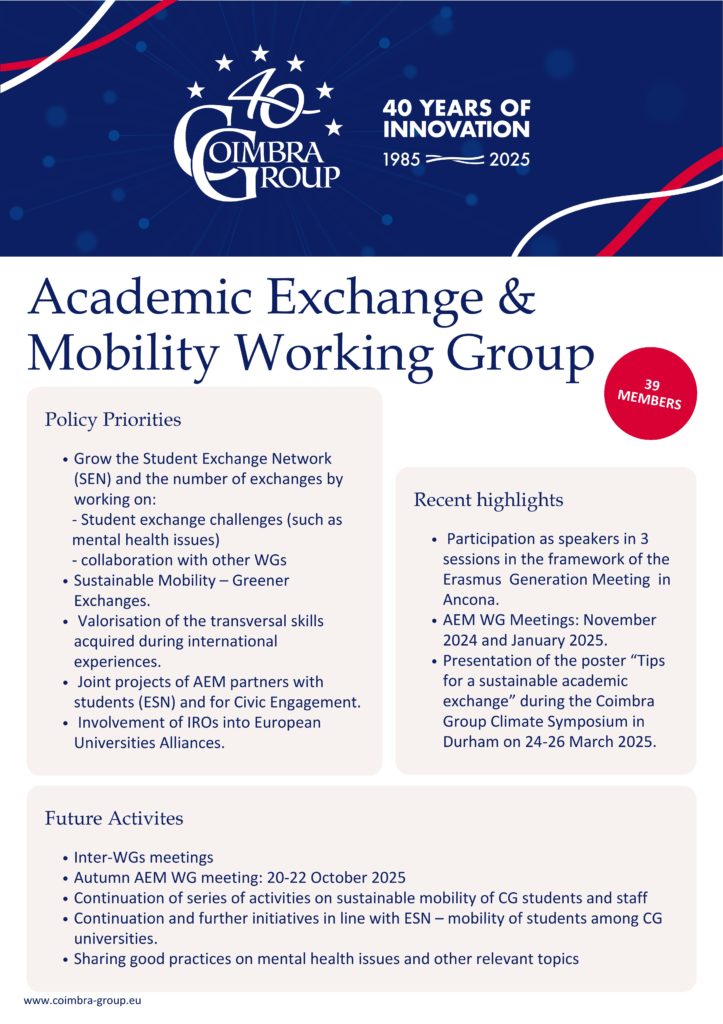
Global Partnerships
Working Group
Chair: Sarah-Marleen Dannenberg
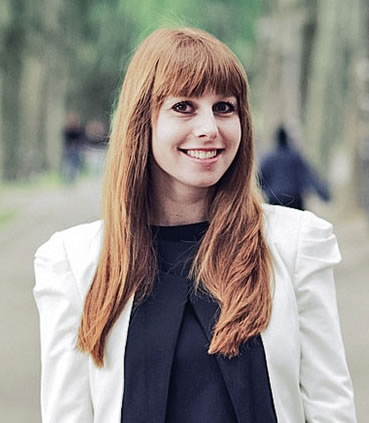
Sarah-Marleen Dannenberg is Regional Offices & DWIH Manager at the International Affairs Division of University of Cologne (UoC). She studied International Information Management with focus on Intercultural Communication at the University of Hildesheim and holds an M.Phil. in Linguistics from Trinity College Dublin. She went to California State University, Northridge and Motril, Spain for research stays. When still a student, she was an active member of the ESN network and Vice President of ESN Germany from 2013 to 2014.
Vice-Chair: Nils Gunnar Songstad
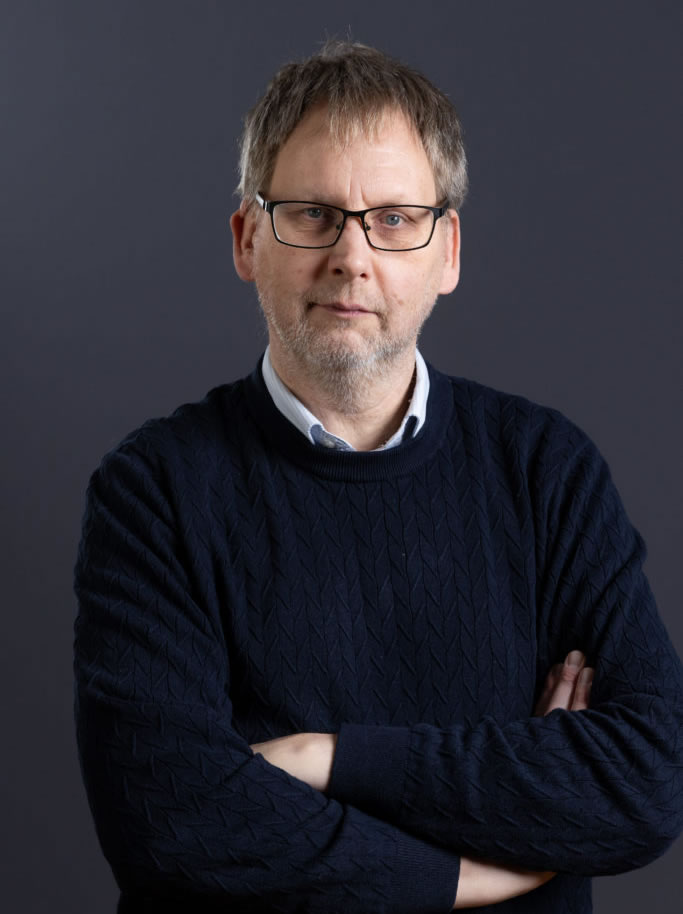
Nils Gunnar Songstad is administrative leader of Global challenges, one of the strategic prioritized areas of University of Bergen, Norway. The unit holds an annual PhD research school, established in 2008, with participants from all over the world. He holds a PhD in health systems research, and his background is in social anthropology and political science. He has extensive work experience in East Africa through development, research and research administration. His main focus is to promote collaboration between scientific disciplines in addressing global challenges, and to stimulate collaboration with the Global South based on mutual responsibilities.
Working Group Focus
The global social responsibility of Universities requires their active engagement with global cooperation issues and challenges. The Coimbra Group aims at increasing such engagements to create an effective response to major cooperation challenges and a fruitful relation with the main global partnership and development agencies, in primis the European Union (EU).
The academic world plays an important role as promoter of a broad and solid approach to global cooperation, the promotion of a global citizenship education and the implementation of a participative approach to research and for global partnerships.
The activities of the Global Partnerships Working Group align with global and European policies in the sense that they refer to actual challenges in global partnerships, especially concerning the SDGs and their implementation in decolonisation and education.
Priorities for 2025-2026
- Supporting the implementation of the Africa Charter for Transformative Research Collaborations through close collaboration with Perivoli Africa Research Centre, University of Bristol, UK.
- Implementation of joint training sessions and education programmes (e.g. summer / winter schools) to contribute to the improvements of institutional capacities, and implementation of joint training sessions and education programmes in the framework of Erasmus+ projects.
- Sharing knowledge and experiences on research for cooperation models, including a critical review of cooperation with the global majority and the actions of the main international donors.
- Investigation on the role of universities as agents of global cooperation at the country or regional level, including the co-designing of experiences of higher education fostering ownership and human and institutional partnerships.
- Development of a Global Partnerships (and eventually Coimbra Group) language policy in the context of communication on eye-level with the global majority.
Recent highlights since June 2024
- Workshop Decolonising the University, CG Annual Conference in Turku, 5 June 2024. Joint session organised by the Heritage, Latin America and Global Partnerships Working Groups with support from the Coimbra Group WGs Funding Scheme. The purpose of the workshop was to induce a profound rethinking of the colonial entanglement in academic relations through which all sides can mutually benefit.
- The third International Summer School on European Multilingualism took place at the University of Niš (Serbia) on 23-29 June 2024. The activity involved teachers from universities of Coimbra, Graz, Jena, Poitiers (project coordinator) and Salamanca. The aim of the intensive short programme on European Multilingualism and Cultural Mediation Studies was to share innovative linguistic approaches to teaching and learning languages. The programme offered courses of translation and language application in several small tandem groups: English, German, French, Portuguese, Russian and Spanish. In addition, Language Discovering Workshops enabled all participants to learn about the Less Widely Used and Lesser Taught languages (LWULT) and their important role in keeping language diversity and the world’s multilingual heritage. The Summer School offered two LWULT Workshops: Serbian and Turkish.
- Conference: The Africa Charter: Advancing transformative research collaborations between Africa and the rest of the world, in Brussels on 6-7 November 2024, with support from the Coimbra Group WGs Funding Scheme. A two-part, interactive workshop, convened jointly by the University of Bristol and the Coimbra Group Global Partnerships WG, with the support of the University of Bergen, to present and discuss the Africa Charter for Transformative Research Collaborations. The Africa Charter, co-created by Africa’s major higher education constituencies, is an Africa-centred framework for advancing a transformative mode of research collaborations that will serve to uphold the continent’s place in- and foster a more equitable- global system of scientific knowledge production. It was co-facilitated by the University of Bristol’s Perivoli Africa Research Centre. The Coimbra Group was amongst the first signatories, which now number more than 100 institutions.
- Conference: Building together: European and African Collaboration in Research and Innovation, at the University of Pavia (Italy) on 27 November 2024. The conference aimed to foster a collaborative spirit by bringing together leading professors from Africa and Europe and representatives of public institutions to explore synergies, share knowledge, and co-develop solutions to global challenges. The experts of the event included members of two important European networks, the European Association of Development Research and Training Institutes (EADI) and the Global Partnerships WG, alongside representatives from African universities.
Ongoing/forthcoming activities 2025-2026
- The fourth International Summer School on European Multilingualism will be held at the University of Coimbra, Portugal, on 22-28 June 2025. The event will involve faculty from various European universities, including those in Graz, Würzburg, Salamanca, Pavia, Poitiers, and Coimbra. The programme focuses on innovative language teaching approaches, offering courses in translation and language application in small tandem groups for languages such as German, French, Italian, Portuguese, and Spanish. Additionally, the Summer School will feature a Language Discovering Workshop highlighting Less Widely Used and Lesser Taught languages (LWULT), with special workshops on Kurdish and Romani to emphasize their role in preserving language diversity and multilingual heritage.
- Continued cooperation with the Perivoli Africa Research Centre, University of Bristol (UK) on the implementation of the Africa Charter for Transformative Research Collaborations. The Charter demands more equitable and more inclusive research relationships with higher education institutions in Africa. The Global Partnerships WG will work closely with all CG universities and other WGs to organise events to promote and disseminate knowledge on the Charter.
- Preparation of an application for COST funding together with interested CG members to advance active engagement with – and an implementation of – the principles and aspirations of the Africa Charter across disciplinary fields.
- WG sessions at the CG 2025 Annual Conference at the University of Bologna:
- University and local authorities: joint models of global partnerships and actions organised by the Global Partnerships WG and open to all delegates (11 June 2025).
- The role of universities as agents of global cooperation: the role of the recent geopolitical situation in our cooperation with the Global Majority in research and co-creation organised by both the Global Partnerships and Academic Exchange and Mobility WGs. The specifics are still being finalized (11 June 2025).
- Coimbra Group Initiative of Peace and Conflict Studies: Reimagination of the programme with new partners. The redesign is underway, with final details yet to be confirmed.
- One-day symposium on Africa-Europe research collaboration in Bergen, Norway on 3 December 2025.
- Formation of a sub-group on Climate action and Sustainability following the Coimbra Group Climate Symposium at the University of Durham, 24-26 March 2025.
Contact person at the CG Office: Catarina Moleiro (moleiro@coimbra-group.eu)
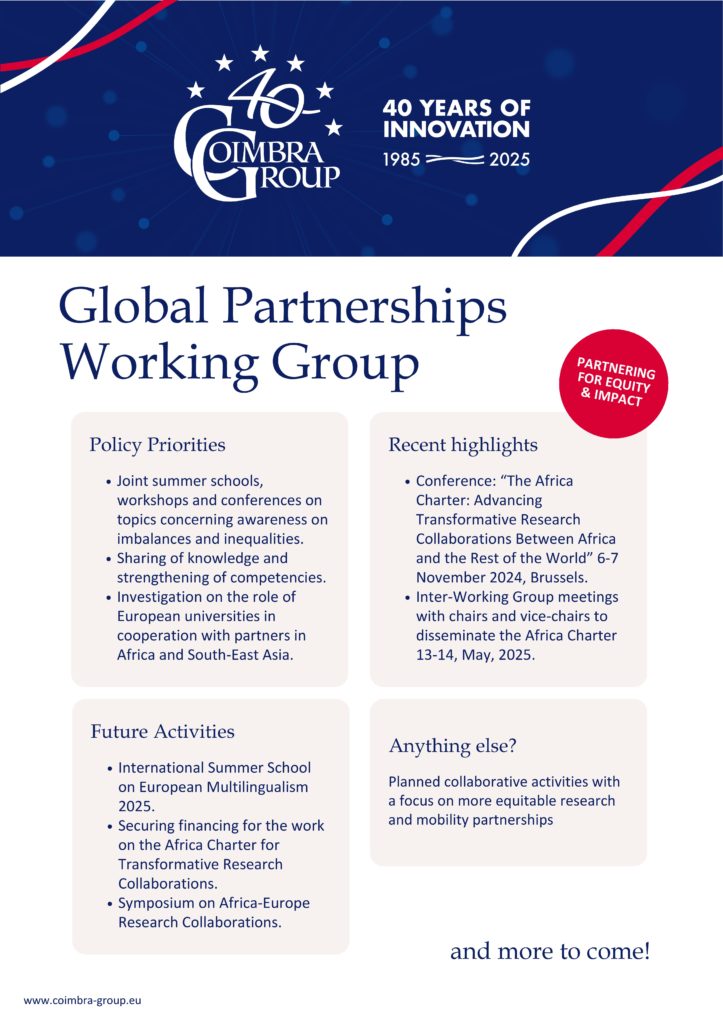
Life Sciences
Working Group
Chair: Lino Ometto
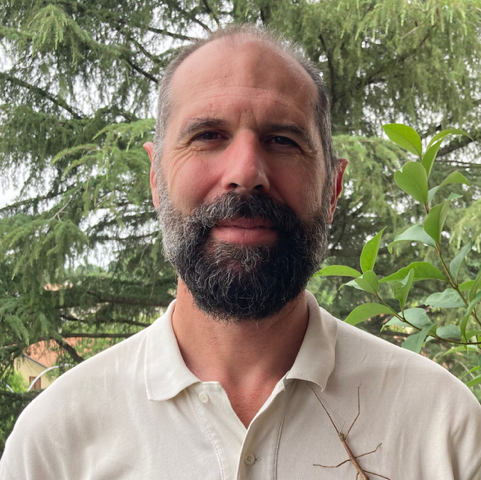
Lino Ometto holds the position of Associate Professor of Zoology at the Department of Biology and Biotechnology of the University of Pavia. He grew up with a keen interest in animals and he likes to think of himself as a zoologist with a sweep net in one hand and a genome in the other. His research interests are aimed at better understanding the origin of adaptive traits in insects (& friends) using population genetics and molecular evolution approaches. After graduating in Biology from the University of Padova, he obtained his Ph.D. in Natural Sciences from the Ludwig-Maximilians University of Munich under the supervision of Wolfgang Stephan. He then studied the evolution of gene expression in ants in Laurent Keller’s lab at the University of Lausanne. He has always enjoyed sharing his passion and interests with students and people in general, and he is regularly involved in outreach initiatives. He is president of the Italian Society for Evolutionary Biology.
Vice-Chair: Marta Camps Camprubí

Dr. Marta Camps Camprubí is Associate Professor in Biochemistry and Vice-Dean for international relations and student mobility of the Faculty of Biology, University of Barcelona. She has been in charge of the student mobility at Faculty of Biology from 2009. Her research interests and expertise cover adipose tissue, obesity and diabetes and she is the author of more than 50 scientific papers in the biomedical field. She has been a member of the Life Sciences Working Group (Coimbra Group) since 2017 and from 2022 she has been coordinating the Life Sciences WG Blended Intensive Projects (BIPs).
Working Group Focus
The proposed actions aim to enhance the excellence and competitiveness of our universities in the context of the Life Sciences, considering the whole field of academic engagement, i.e. teaching, research and transfer, all considered in their broadest context. The focus of the working group is on the development of common strategies for teaching and research. Master’s programmes are of utmost importance for high-level education and the development of skills for future high-level life scientists, as well as the first step in the development of life science research and the promotion of careers in the life sciences. We have identified Master’s projects of common interest to exchange students involved in these programmes.
Priorities for 2025-2026
- Master Cancer Biology
- Master Global Change Ecology
- Blended Intensive Programmes and Student’s Mobility
- Exploring the possibility of creating joint double degree or European degree programmes
- Discussing the impact of AI on life science research and teaching
Recent highlights since June 2024
- BIPs (Blended Intensive Programmes)
- Environmental Remote Sensing 2024-2025, coordinated by Dr. Shawn Carlisle Kefauver, University of Barcelona with the Universities of Pavia, Poitiers, Würzburg (CG Universities), the University of Twente, the University of Helsinki, University College Dublin and the University of Agronomic Sciences and Veterinary Medicine.
- Presentation of basic to advanced techniques and concepts of environmental remote sensing in the field of applications in agriculture and forestry, ecology, water quality, oceanography, urban planning, air pollution monitoring, and climate change.
- Theory and current use of fixed sensors, field sensors, manned and unmanned aerial platforms, and ESA and NASA satellites.
- Discuss concepts, methodologies, and best practices related to the remote sensing of different natural, anthropogenic and hybrid environments, including quantitative measurements related to plants, water, soil, geological, and urban assessments.
- Human Organoids: model systems for human biology and medicine 2024, coordinated by Dr. Ana Sevilla, University of Barcelona, with the Universities of Montpellier and Vilnius (CG Universities), Karolinska Institute and the University of Strasbourg.
- Stem cells biology and regenerative medicine.Reprogramming methods, characterization, differentiation to specific lineages, brain organoids and genetic manipulation.Ethics, public engagement/ and science communication.
- Immunofluorescence, qPCR and FACS analysis.
- Redox Biology in Health and Diseases 2025, coordinated byProf. Teresa Carbonell, University of Barcelona, with the Universities of Coimbra and Pavia (CG Universities) and the University of Wroclaw.
-
- Stress signalling, survival and resilience during the evolutionary development of life.
- Redox chemistry based on sulphide, nitrogen and oxygen.
- Formation of ROS in the body. Enzymatic production of superoxide, hydrogen peroxide, nitric oxide and derived species. redox interactome.
- Effects of free radicals on biomolecules: lipoperoxidation. Protein oxidation. Oxidation of carbohydrates. DNA oxidation.
- ROS scavenging: the Keap1-Nrf2 pathway. Enzymatic and non-enzymatic antioxidants. The glutathione system.
- Oxidative stress in physiology. Nutrition and antioxidants. Aging and frailty.Redox signalling as a fundamental control for adaptations to the physiology of physical exercise.
- Redox imbalance and oxidative damage in pathological processes: Metabolic diseases. Atherosclerosis Neurodegenerative diseases. Cancer.
- Methodologies for the analysis of markers of oxidative stress, oxidants and antioxidants.
- Environmental Remote Sensing 2024-2025, coordinated by Dr. Shawn Carlisle Kefauver, University of Barcelona with the Universities of Pavia, Poitiers, Würzburg (CG Universities), the University of Twente, the University of Helsinki, University College Dublin and the University of Agronomic Sciences and Veterinary Medicine.
- European Joint Degree project.
Ongoing/forthcoming activities 2025-2026
Master’s Programmes in Biosciences:
- Cancer Biology 2025
The Universities of Åbo Akademi, Barcelona, Coimbra, Cologne, Montpellier, Pavia, Salamanca, Tartu, Turku, Utrecht, Vilnius and Würzburg are involved. We are planning to reorganise the programme’s supporting activities (e.g. summer school, webinar) and the requirements for the Coimbra Group certificate.
Re-application for Erasmus Mundus funding (Pavia, Montpellier, Montreal) coordinated by the University of Pavia.
- Master Global Change Ecology 2025
A Double Degree programme of the Universities of Bergen and Würzburg has started. Other universities may be involved.
- Double degree and/or European degree Master programmes 2027
We are exploring the possibility of setting up a joint programme on a topic that we will identify as the most promising in terms of existing collaborations and novelty, building for example on the collaborations and networking already established with the BIPs.
- BIPs (Blended Intensive Programmes):
- Liposomes to improve pharmacological treatments of infectious and cancer diseases
2026, coordinated by Prof. Amparo Sanchez Navarro and Maria Sacristan, Universities of Salamanca and Würzburg.- Relevance of nanotechnology in the pharmaceutical area to improve the benefit/risk balance of pharmacological treatments, in particular for cancer and infectious diseases.Advantages and disadvantages of liposomes as drug nanocarriers for drug targetingIntegrate molecular biology of cancer or infections with pharmacology and pharmaceutical technology.
- Design liposomes tailored for the efficient delivery of drugs at the tumours or infected tissues.
- Liposomes to improve pharmacological treatments of infectious and cancer diseases
- New editions of the following BIPs (see above under “recent highlights” for details):
- Environmental Remote Sensing coordinated by Dr. Shawn Carlisle Kefauver, University of Barcelona.
- Human Organoids: model systems for human biology and medicine, coordinated by Dr. Ana Sevilla, University of Barcelona.
- Redox Biology in Health and Diseases coordinated byProf. Teresa Carbonell, University of Barcelona.
- Preparation of a new BIP on Advanced Immunology for 2026-2027, coordinated by Marie-Alix Poul University Montpellier with the University of Barcelona.
Contact person at the CG Office: Ester Zangrandi (zangrandi@coimbra-group.eu)
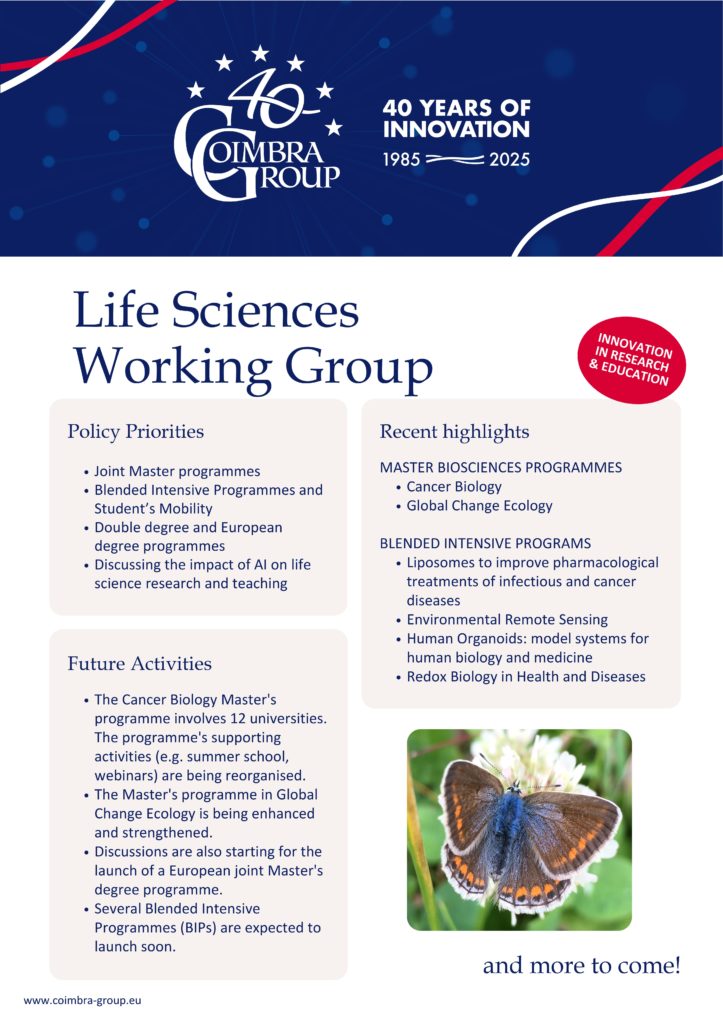
Heritage
Working Group
Chair: Bernadette Biedermann
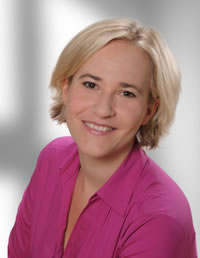
Bernadette Biedermann (Mag. Dr. phil.) studied museology and art history at the University of Graz. She currently works as museologist, curator and researcher at the University Museums of the University of Graz. She is Deputy Head of University Museums of the University of Graz. Her research focuses are: theoretical museology, object-based research, museum documentation, museum communication and forms of museum presentation; she is co-editor of the journal “Curiositas”.
Vice-Chair: Jeremy Upton
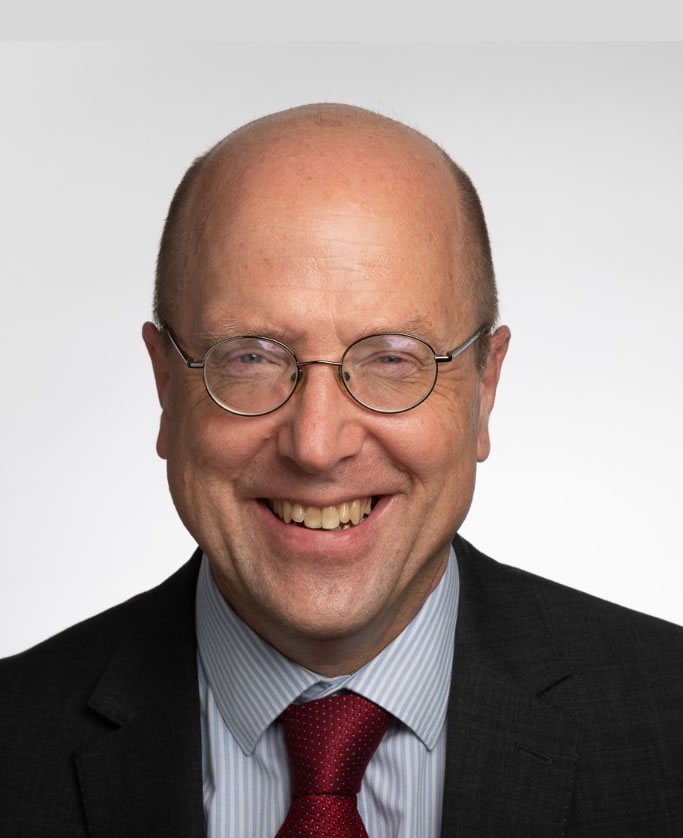
Jeremy Upton is the Director of Library and University Collections at the University of Edinburgh, a post he took up in 2015. His remit covers library and museum collections including the world renowned musical instrument collection held at St Cecilia’s Hall. Jeremy started his professional library career as a music librarian before moving in to general University Library Management. Prior to working in Edinburgh, he was Deputy Director of the library at the University of St Andrews.
Working Group Focus
The Coimbra Group Heritage Working Group (HER WG) provides a space for all people working with cultural heritage, professional staff and researchers, to come together, to share ideas and to understand what the role of cultural heritage is, and what opportunities are provided by cultural heritage in universities. We have developed our work plan so that it focusses on fostering collaboration and asks questions about the issues facing cultural heritage practitioners in universities.
Our work plan is divided into six main areas:
- Cultural heritage and the University.
- Built heritage of Universities.
- Conservation.
- Shared Collections.
- Joint projects and grant opportunities.
- Promotion, networking and outreach.
We recognise that the HER WG operates in a heritage space which is very large, complex and at times confusing. We are increasingly putting our efforts into understanding what we can contribute to the European cultural heritage space, where it makes sense for us to take a lead and where it makes more sense for us to partner with others. The creation of the European University Alliances has provided us with opportunities to collaborate with a new set of networks with a strong interest in culture.has provided us with opportunities to collaborate with a new set of networks with a strong interest in culture.
Priorities for 2025-2026
- International conferences and workshops (setting up Erasmus+ Winter/Summer Schools on a regular basis, international seminar at University of Uppsala on teaching with objects).
- Promotion, networking and outreach (dissemination project on problematic heritage based on HER WG book and approved Horizon Europe project to be scheduled in Brussels; establishment of a conservators’ network).
- Joint projects and grant opportunities (planned Horizon Europe application by the University of Krakow).
- Special focus on problematic heritage (including intangible cultural heritage).
- Publications of international seminars (in newly founded journal “MUSEA. Journal for museology, museum practice and audience”).
Recent highlights since June 2024
- Summer School, University of Padua, September 2024 (Giuliana Tomasella) and Winter School, University of Groningen, December 2024 (Beate Peter).
- Contribution to the Coimbra Group Durham Declaration adopted in March 2025.
- International Seminars and workshops:
- on Sustainability: addressing academic heritage, at the Jagiellonian University of Krakow, November 2024, organised by Joanna Slaga;
- on Conservation: one-day professional practice workshop on paper conservation ethics, processes and materials analysis, June 2024, University of Coimbra & University of Edinburgh, organised by Ruth Honeybone.
- Book publication by Peter Larsen (University of Geneva) and Marketa Krizova (Charles University): “European University Legacies – Problematic Heritage and Contemporary Practice ” (link) published at Edinburgh University Press with support from CG WGs funding scheme.
- Approval of a Horizon Europe funded project under the title: COLUMN (“Colonial Legacies of Universities: Materialities and New Collaborations”, link). Project lead: University of Utrecht (Gertjan Plets).
Ongoing/forthcoming activities 2025-2026
- Kick-off of Horizon Europe project: COLUMN (“Colonial Legacies of Universities: Materialities and New Collaborations”). Project lead: University of Utrecht (Gertjan Plets).
- Planning of HER WG Summer and Winter Schools on regular basis.
- Planning of HER WG international seminar series: Uppsala University in Autumn 2025 (Mikael Ahlund).
- Developing a platform for conservators (Ruth Honeybone, University of Edinburgh).
- Presenting shared collections online.
- Publication of international seminar series using “MUSEA. Journal for museology, museum practice and audience” (University of Graz) as a publication platform
Contact person at the CG Office: Emmanuelle Gardan (gardan@coimbra-group.eu)
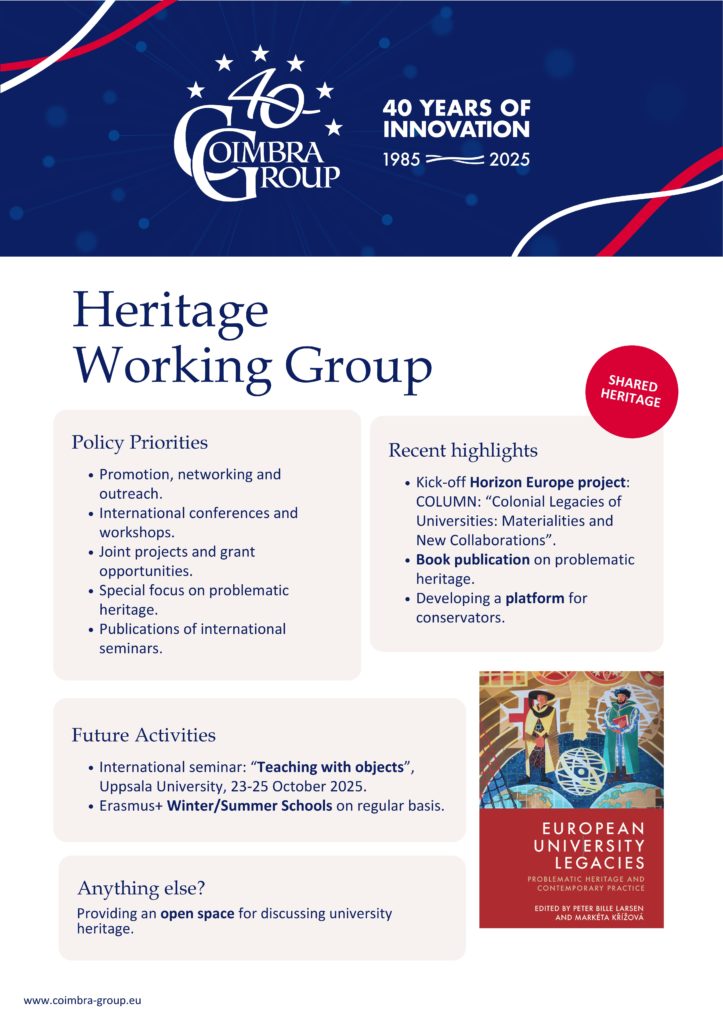
Research Support Officers
Working Group
Chair: Adéla Jiroudková
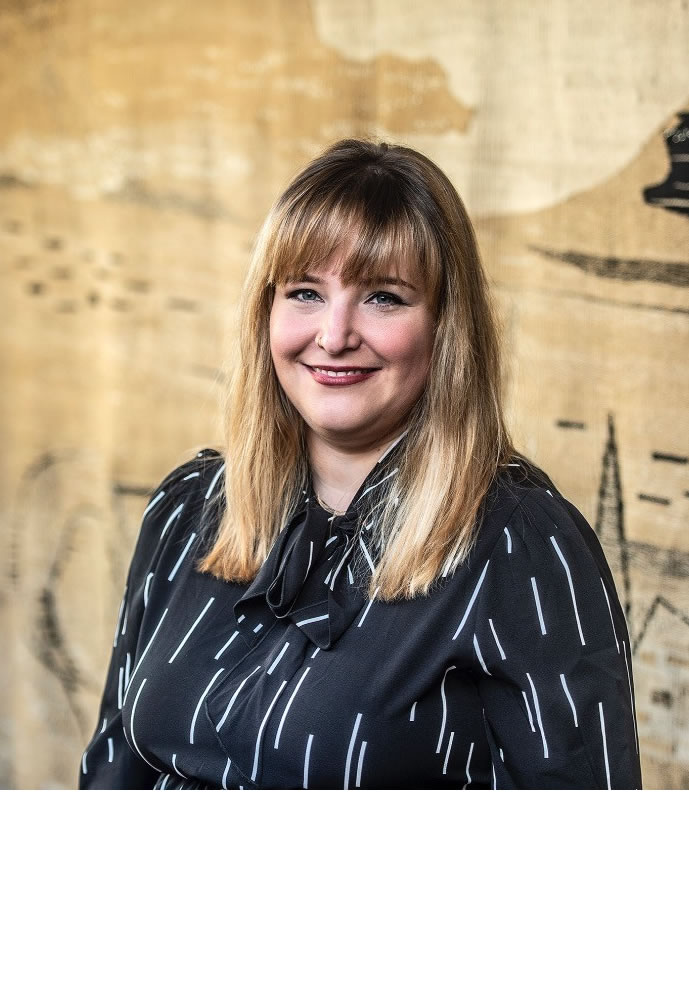
Adéla Jiroudková serves as the Head of the Research Support Office at Charles University, bringing over a decade of specialized experience in research administration to her role. Her journey in this field began with a position as Project Manager, where she was responsible for both pre-award and post-award management. Adela now directs a wide array of research support activities, from project planning to funding. In addition to her primary responsibilities, she actively contributes to various institutional initiatives, such as the implementation of the Human Resources Strategy for Researchers (HRS4R) and the Gender Equality Plan. On the national level, Adela serves as a Board Member for CZARMA, the Czech counterpart of the European Association of Research Managers and Administrators (EARMA).
Vice-Chair: Jutta Schloon
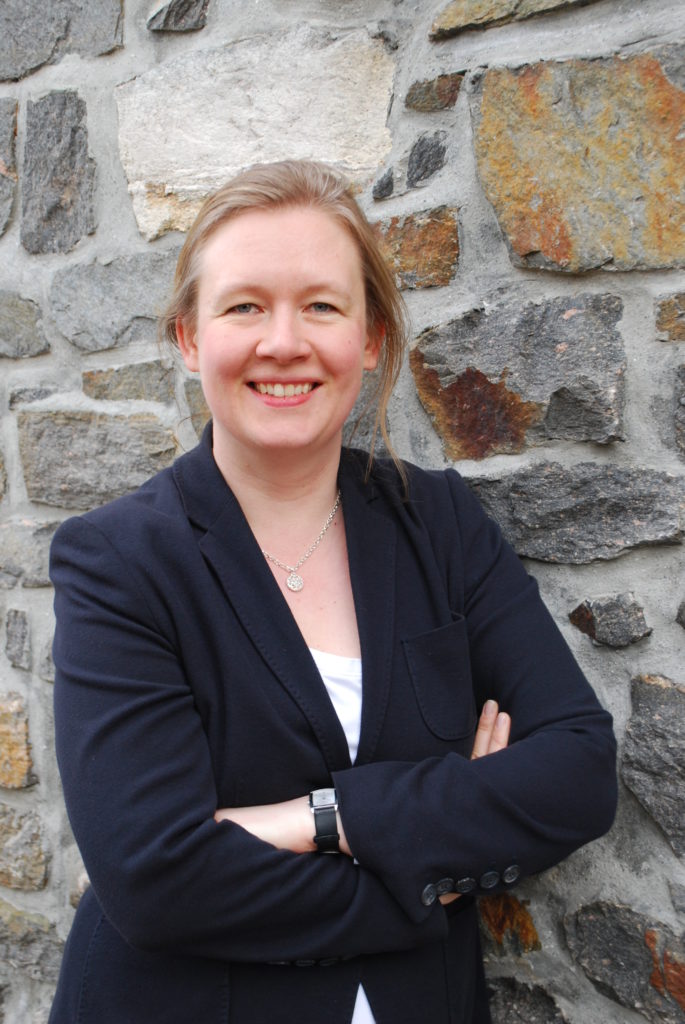
Dr. Jutta Schloon is a Senior Research Advisor at the University of Bergen’s Division for Research and Innovation. She provides comprehensive pre-award services to researchers seeking European funding and large national grants, with a particular focus on the Social Sciences and Humanities. In addition, she coordinates the Trond Mohn Research Foundation-UiB Career Program for young researchers. Jutta holds a PhD in Literary Studies and has an academic background in German Studies, French Studies, and Business Administration. Her extensive international experience spans both the academic and cultural sectors, having worked in Germany, Switzerland, France, and Norway. Jutta began her career in research management as a scientific coordinator for a Collaborative Research Centre at the University of Freiburg, Germany, before relocating to Norway in 2013.
Working Group Focus
The Coimbra Group elevates research as a key component alongside education and innovation within its member institutions, addressing challenges at various scales. It provides a unique platform for shaping European research policies and fostering best practices in research support. The Research Support Officers WG unite over 60 university representatives to enhance research strategies through idea exchange and expert collaboration.
Actively engaging with European Research Area (ERA) priorities, the group focuses on:
Collaborative synergy: Strengthening interdisciplinary and cross-sectoral research collaborations, ensuring alignment with ERA’s strategic framework on research integrity, security, and AI in research.
Strategic policy advocacy: Assisting the Executive Board in shaping research policy, crafting position papers on European Research Policy, and engaging with other stakeholders. This aligns with ERA’s focus on inclusive and sustainable research environments, open science, and research security.
Best practice & experience sharing: Hosting experts and knowledge-sharing events on research management, funding, and policy, aligning with ERA’s knowledge valorisation and excellence agenda.
Facilitating knowledge exchange: Promoting mobility of research support staff to enhance collaboration and expertise sharing across European institutions, contributing to research careers and mobility objectives of ERA.
Priorities for 2025-2026
- Exploring Generative AI in Research Management – Understanding AI-driven tools for enhancing productivity, in line with ERA’s focus on AI in science and research assessment reform.
- Best Practice in Research Support within European University Alliances – Strengthening international research competitiveness and collaboration.
- Synergies between Education and Research – Enhancing the integration of teaching and research for societal impact and excellence.
- Enhancing Research Resilience & Crisis Management – Developing strategies for research continuity, aligned with ERA’s research security framework.
- Research Integrity and Ethics – Supporting ethical research practices and integrity in response to evolving challenges in the research landscape.
Recent highlights since June 2024
- March 2025, RSO WG study trip to Brussels
- Purpose: Engage with key EU institutions to enhance RSOs’ strategic knowledge and collaboration.
- Meetings with EU institutions: Discussions with the ERC Executive Agency, DG EAC’s MSCA Unit, and DG RTD on research funding, evaluation, and future framework programmes.
- Networking & strategy development: Exchange with the Austrian Liaison Office and UiB Brussels Office on stakeholders’ communication and collaboration.
- November 2024, RSO WG meeting at the University Coimbra
- Focused on generative AI in proposal development and general research support work.
- Key topics included:
- Presentation on Responsible AI Use in Research by the University of Bologna’s ARIC – Research Division’s approach.
- Hands-on showcase on how AI tools are being integrated into everyday office work and proposal writing.
- Discussions on AI in research support, including:
- A repository of AI-related events.A list of common-use AI tools for research support.
- A list of common-use AI tools for research support.
- Further investigation into AI’s role in research support.
Ongoing / Forthcoming activities 2025-2026
- Online RSO WG meetings every two months, sharing best practices on various topics and the latest EU policy developments. Several topics have already been identified:
- Best practices on Gender & Research – sharing insights on promoting gender equality and inclusive research environments
- RM Framework practices – exploring how we are approaching this and the possible implementation of the RM Framework
- ResearchComp – how do you implement this with your HR services, and how sustainable is it?
- Progress in the use of generative AI in daily work
- Research security and dual-use of results
- Exchange of knowledge on how we are working with audits – can audits influence the financial services of the university?
- Discussion on the first Work Programme for FP10 (2026) – providing input to shape future European funding priorities.
- Exploring funding opportunities via COST.
- Regular RSO WG Spring meeting in Brussels with the European Commission.
Contact person at the CG Office: Emmanuelle Gardan (gardan@coimbra-group.eu)
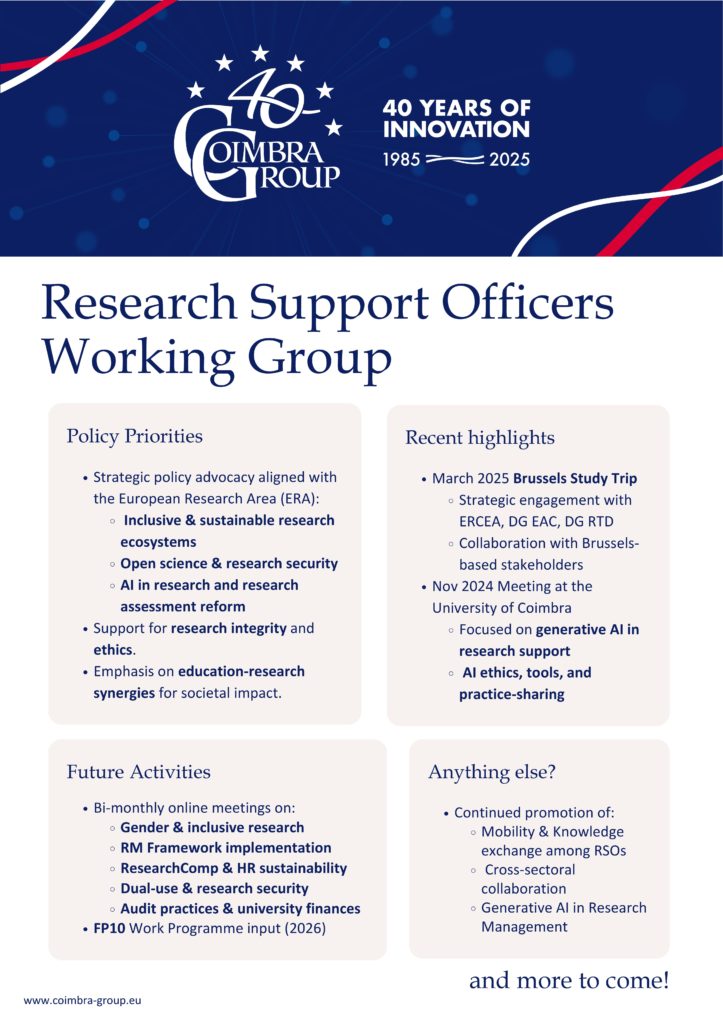
Latin America
Working Group
Chair: Mara Constantinescu
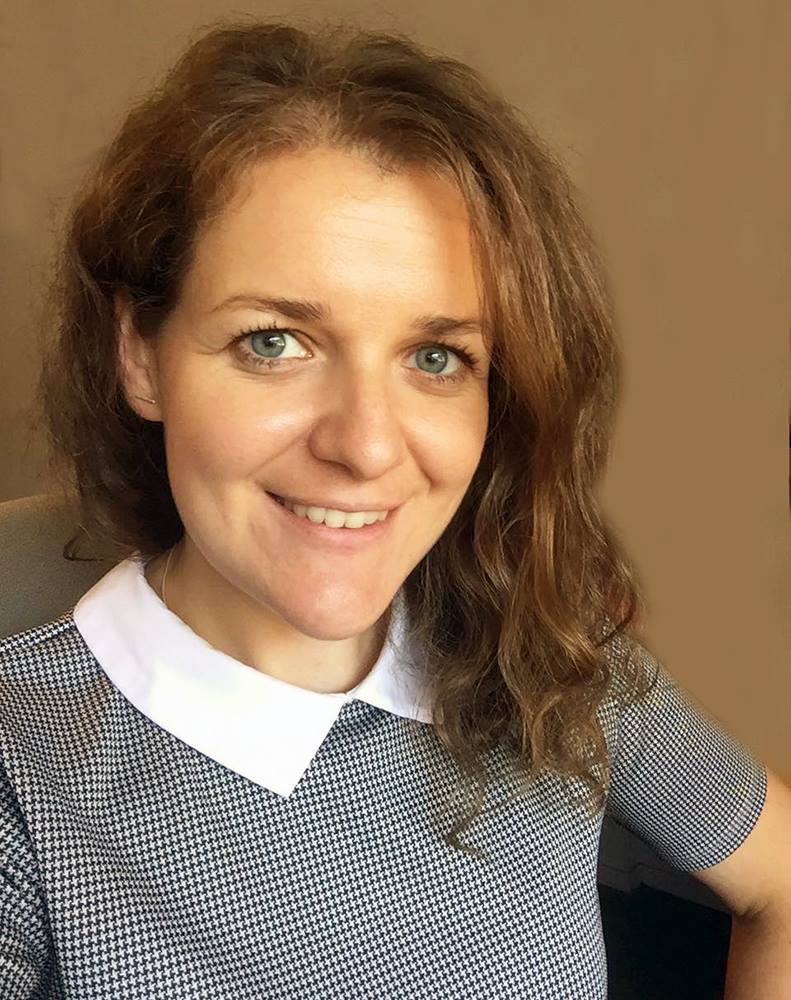
Mara Constantinescu is Coordinator for Latin America at Leiden University. Professionally qualified in International Relations, her research interest lies on higher education policy in Latin America and knowledge production in cooperation with Latin America. She has obtained a MA Suma cum Laude in Latin American Studies from Leiden University. She is currently overseeing research and education collaborative projects with Latin American partners and represents Leiden University in Leiden-Delft-Erasmus consortium initiative on cooperation with the Global South.
Vice Chair:
(To be updated soon)
Working Group Focus
The Latin America Working Group (LA WG) aims to promote a space for scholarly exchange and interaction between Latin American Universities and Universities in the Coimbra Group, through which to ensure collaborative action takes place, that is impactful in both regions. Research, policy development and knowledge exchange, and knowledge diplomacy should be rooted in understanding local and national priorities within Latin America, as well as strengths and benefits of collaboration in both regions, in order to implement long-term, sustainable partnerships.
Collaboration for academic advancement, knowledge dialogue and research development between European universities and Latin American institutions have a long tradition. The Coimbra Group has played an important role in providing links to institutions and networks which are relevant to this cooperation and has also in the past facilitated many initiatives and projects to the benefit of member institutions. Aimed to increasing knowledge of the opportunities and challenges in both regions, the LA WG will pursue a jointly agreed set of shared goals and synergies among Coimbra Group Universities, in order to increase the quality and quantity of academic cooperation with Latin American institutions, networks and agencies. With this perspective the LA WG will follow the numerous opportunities created by ongoing high level policy dialogues between the two regions. It is essential to understand the Latin American context from a ‘global’ perspective and define the role of Latin American experiences in tackling global challenges.
A key priority for the LA WG has been to reinforce and develop cooperation with networks in Latin America, such as AUGM, CLACSO, UDUAL, among others, with an approach that is based on building trust through activities promoting knowledge exchange and development. These include: research round tables, leading to joint research proposals; jointly created enhancement programmes and shared capacities around themes of mutual interest; mobility and exchange opportunities; as well as joint activities aimed to generate interaction at postgraduate level.
Contributing to the achievement of the above aims, the LA WG has focused on engagement with a range of institutions and organisations across Europe and Latin America (e.g. EU-LAC Foundation, EU Commission’s DG RTD, CLACSO, UNESCO, etc.) to support policy and practice discussions, contributing to plans and actions that are inclusive of Latin American higher education cultures and expertise, including research, teaching and professional services.
Priorities for 2025-2026
- To elaborate and disseminate the call for papers for the second edition of the book “Why Latin America Matters” (link to first edition) as a platform for discussion and interaction on the role of the region in future global development, this time from a Latin American perspective. We aim at having the final draft ready for print by the end of 2025/beginning 2026.
- To enable a platform for exchange with similar networks in the region (focusing on CLACSO and AUGM), in order to develop joint activities with a concrete impact in shaping the research and education EU-LAC collaborative landscape.
- We strive to organize a joint high-level event in collaboration with CLACSO (end of 2025 in Brussels). Its main focus is to set up a co-created cooperation agenda that will enhance the potential of EU-LAC cooperation bridging different initiatives in both regions (e.g. Global Gateway, new EU R&I framework programme etc.)
- To engage with EU and Latin America-based institutions and political representatives in both regions to contribute to policy development that promotes sustainability and socio-economic inclusion in Latin America and that enables a reflection over the role of Latin America in global politics and sustainable development.
- To explore the potential of joint activities across CG working groups, enhancing Coimbra Group’s expertise in European engagement with the Majority World.
- Explore funding opportunities across EU programmes (ERASMUS, Horizon Europe, etc.) as well as Latin America-focused funding bodies (UNESCO, EU-LAC Foundation, etc.), to support collaboration across research and education.
- The CG Durham Declaration offers a broad and inclusive framework aligned to the objectives of EU-LAC cooperation. We will henceforth focus on finding an appropriate funding scheme to implement the principles of the declaration in cooperation with partners in the region.
Recent highlights since June 2024
- Following up on the LA WG participation at the CLACSO conference in 2023 and initial conversations during CG high level event in Montevideo, Uruguay, a Memorandum of Understanding was signed between Coimbra Group and CLACSO in August 2024.
- Together with the Global Partnerships and Cultural Heritage WGs we organized a first workshop on “Decolonizing the university”,with support from CG WGs funding scheme. The core idea of the workshop was to share experiences of researchers who have built solid research/teaching experiences with non-European realities based on intercultural and collaborative principles in order to enhance added value and good practices.
- Development of an Erasmus+ funding application submitted in February 2025 under the title INCAS (‘INstruments to Connect Academia to Society’).
Ongoing/forthcoming activities 2025-2026
- Cooperate in an international, interdisciplinary and multi-actors event organized around the celebration of Coimbra Group 40th anniversary, both in Europe and Latin America (around the upcoming COP 2025 in Brazil).
- LA WG event in Brussels, Autumn 2025. This event aspires to highlight the spirit, and crucial importance, of intellectual independence in securing the traditional role of universities as knowledge-based influencers on public policy. The event will join academics, researchers, and policymakers from Europe and Latin America fortifying partnerships based on the fundamental principles of academic freedom that have long defined university traditions in both regions. Eyed outcome: two (thematic) policy briefs on academic freedom as a prerequisite for being able to provide sound and reliable research on global challenges important for Latin America, the Caribbean (LAC) and Europe. The policy briefs will be submitted to the EU Commission/EEAS before the high-level EU-CELAC meeting.
- Develop a funding application, in either education or research, under the framework of relevant European Commission programmes (e.g. Erasmus+, Horizon Europe, etc.)
- Joint (potentially with CLACSO) academic seminar in LAC (Colombia, around the dates of the CLACSO conference) on selected common/cross cutting challenges for LAC and Europe.
- Continue to engage with EU-LAC Foundation and the Academic Forum of the Permanent Academic Forum between Latin America and the European Union – FAP ALC-UE (and other relevant networks), through participation at key events and collaboration in the development of concept notes and supporting documentation for international organisations and governments in both regions.
- Foster ties, and explore possibilities for formal cooperation agreements, with central European actors in LAC such as Fundación Carolina, DAAD, SEGIB, CALAS and others.
- Elaborate and disseminate the call for papers for the 2nd edition of the book “Why Latin America Matters” (potentially in cooperation with CLACSO). We aim at having a final draft ready for publishing in the beginning of 2025.
- Explore the possibility of organizing a second CG high-level event with significant academic input and the broad participation of private and public stakeholders aiming to co-create a joint agenda for collaboration (first edition took place in Montevideo, Uruguay, 5-6 December 2022under the title “Strengthening academic collaboration between Latin America and Europe”).
Contact person at the CG Office: Catarina Moleiro (moleiro@coimbra-group.eu)
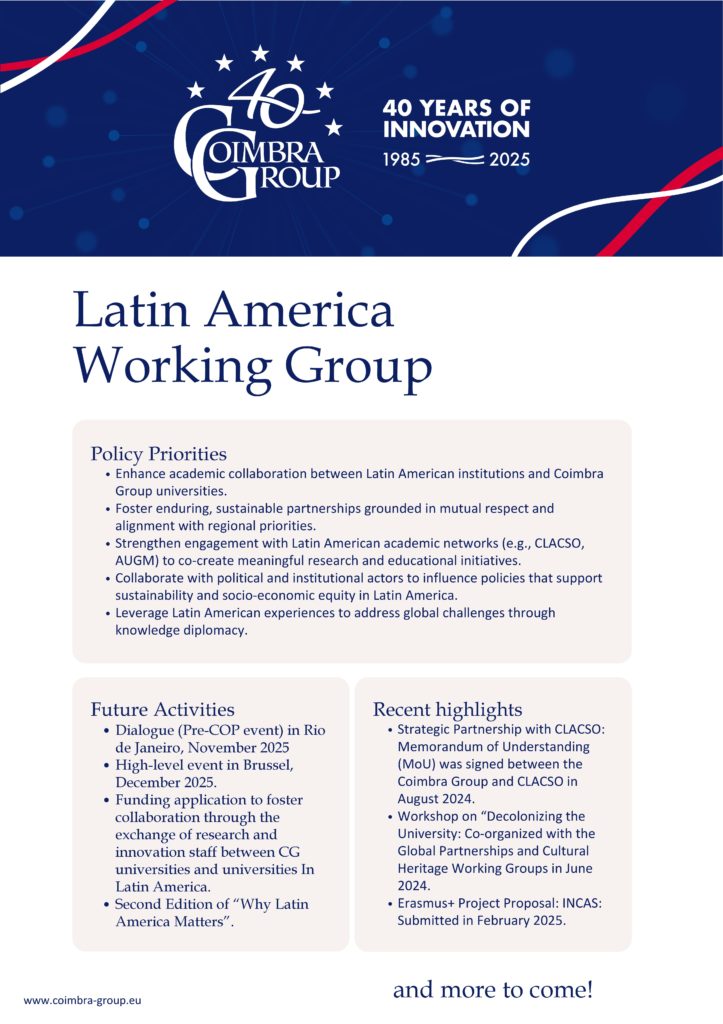
Doctoral Studies
Working Group
Chair: Adriana Zait
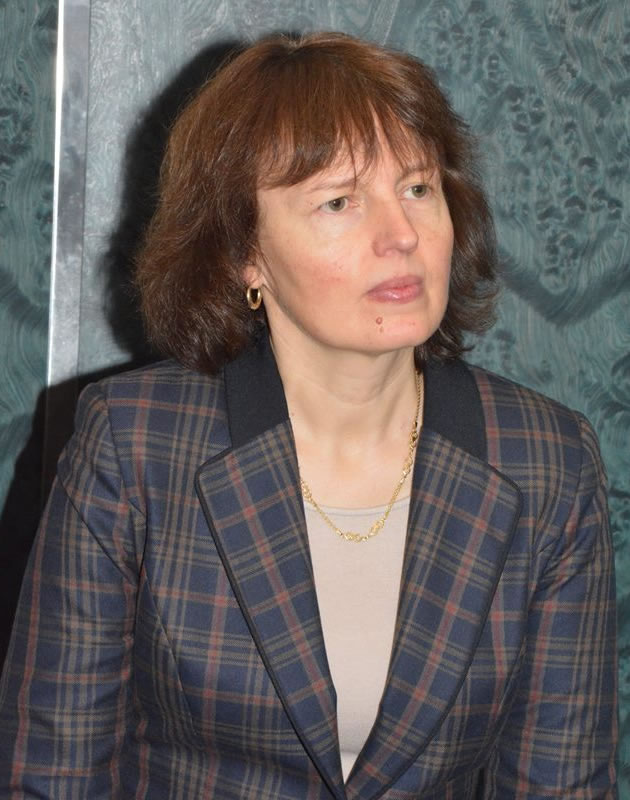
Adriana Zait is professor and director of the Doctoral School of Economics and Business Administration from University Alexandru Ioan Cuza Iasi, Romania. She holds a PhD in econometrics and teaches business research methods, intercultural management, services marketing and public relations. As PhD theses coordinator in Marketing, she supervised 29 doctoral students from 2007 to the present, and has been member in more than 30 doctoral coordination commissions.
Her main interests are in ensuring an interdisciplinary and intercultural education for doctoral students, in a research environment in quest of a better adaptation to the complexity, volatility and incertitude of our world.
Vice-Chair: Elise Pinta

Head of the Research Career Unit, PhD Elise Pinta is long-standing developer of doctoral training at University of Turku. She holds a PhD in medicinal biochemistry and is also trained as a teacher, rector and university administrator. Pinta has been establishing doctoral programs and graduate school activities, such as university-wide transferable skills training, supervisor training and different mentoring programs. Pinta is also an active player in national and international networks (latest, European University EC2U consortium’s Cotutelle & Doctoral Training Cooperation task force and National ERA4 action group coordinated by Unifi (Council of Rectors of Finnish Universities)).
It was Pinta’s initiative to organise the first national doctoral education day in Finland, now an annual tradition. Her development efforts are currently focused on strengthening cross-sectoral cooperation and supporting the well-being of early-career researchers.
Working Group Focus
Doctoral Studies constitute a key activity and major priority for multi-disciplinary research universities and represent one of the most important contributions of universities to the development of societies, through creative and collaborative approaches. Significant challenges and changes in higher education and substantial reforms of doctoral education and early research careers across Europe are central to the strategies of universities, and the DS WG fully assumes its important role in this process, fostering both rigorous doctoral training and meaningful doctoral research results.
The main remit of the Working Group is on a permanent exchange of information, sharing of best and innovative practice and joint activities of Coimbra Group Universities and corresponding European University Alliances in the organization of doctoral programmes and support of early research careers. We assist Coimbra Group Universities in their aim of increasing participation in European research and education projects and offer our expertise as an excellent basis for possible contributions of the Coimbra Group to European policy-making relating to doctoral studies and early research careers.
Priorities for 2025-2026
- International collaboration and mobility in doctoral education and research, fostering debates and initiatives for joint programmes, cotutelles, best practices exchanges.
- Participation in research and education projects.
- Reaching out to other Coimbra Group WGs for tackling together common interest topics
- Valorisation of European University Alliances experiences in doctoral education.
- Permanent focus on:
- improving doctoral supervision,
- research communication,
- inter- and trans-disciplinary doctoral research,
- supporting academic and non-academic early research careers,
- reflecting on challenges and trends.
Recent highlights since June 2024
- DS WG online meetings in November 2024 and March 2025, to discuss previous outcomes, as well as priorities and future activities.
- DS WG presentation “Doctoral thresholds – could our data predict the abandon rate?”, EUA-CDE Annual Meeting, 26-28 June 2024, Barcelona.
- Internal analysis on European University Alliances best practices, challenges and future intentions regarding doctoral education and research. Synthesis prepared for the CG Annual Conference in June 2025, Bologna.
- DS WG poster “Doctoral education and Climate action – challenges and solutions” for the Coimbra Group Climate Symposium, Durham, 24-26 March 2025.
- Discussions with Eurodoc and EDEN for fostering common activities in the interest of doctoral students and early research careers.
- Preparing the Coimbra Group 3MT Competition Live Final, 12 June 2025, University of Bologna.
- Joint meeting with the Coimbra Group Employability WG during the 2025 Annual Conference, University of Bologna, 11 June 2025.
Ongoing/forthcoming activities 2025-2026
- Important milestones for higher education and doctoral studies, from the creation of Coimbra Group Universities until now – highlighting the DS WG evolution, June 2025.
- Supporting researchers’ careers: “Round table discussion – After the PhD”, with the participation of CG Universities early career researchers, October 2025.
- Contributing to the coordination committee in charge of developing the initiative to designate 13 May as European Doctoral Day
- Revisiting the Coimbra Group experiences and member universities mechanisms for joint degrees /cotutelles, end of 2025.
- Publication of updated results/report from the doctoral supervision work stream, end of 2026.
Contact person at the CG Office: Emmanuelle Gardan (gardan@coimbra-group.eu)
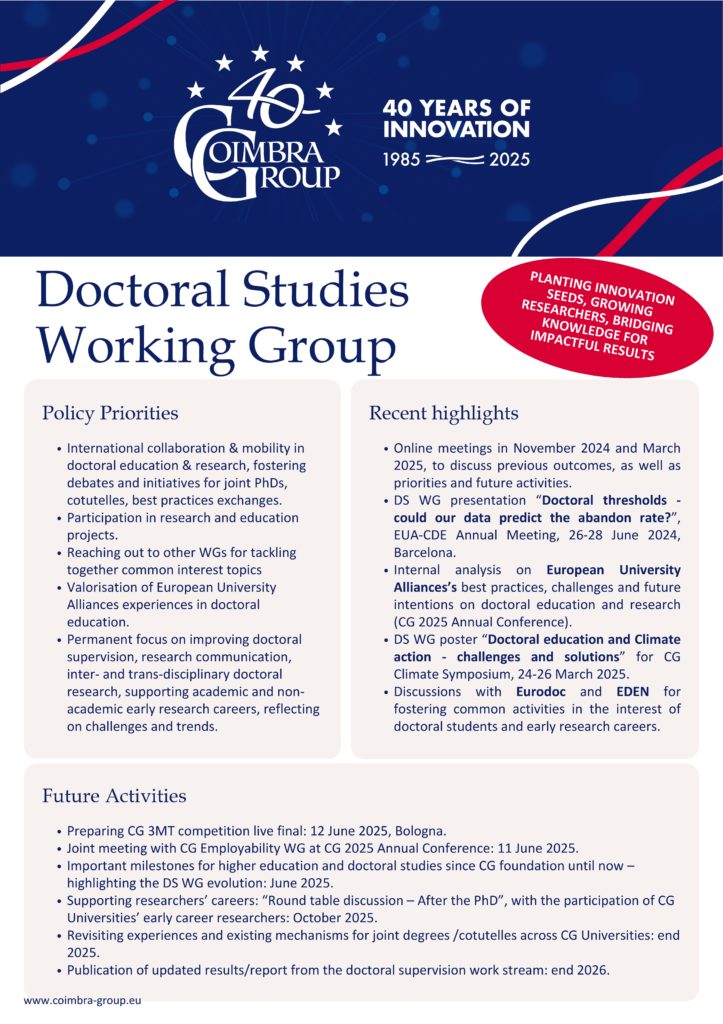
Education Innovation
Working Group
Chair: François Lecellier
François Lecellier is Associate Professor in Computer Science at the Institute of Technology of the University of Poitiers in France. His research interests are focused on image, videos and data processing and clustering. He also works in the field of Learning Analytics in the program Elans to allow a “tailor-made” follow-up, essential to better accompany students’ learning trajectories. He is also chair of Coda project regarding links between high schools and universities. In pedagogy, he works on gamification and use of video games to enhance students’ engagement.
Vice-Chair: Vanessa Vigano
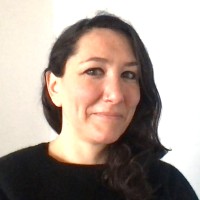
Vanessa Vigano is a Digital Educationalist at the University of Montpellier, where she leads the EdTech and AI work package for the CHARM-EU European University Alliance. She specializes in hybrid and international course design, with a strong focus on challenge-based learning. Her work includes supporting teaching staff across Europe, coordinating the development of hybrid classrooms, and improving virtual learning environments. With a background in communication, UX research, and IT accessibility, she brings a user-centred and inclusive approach to educational innovation.
Working Group Focus
This Working Group aims to share best practices in pedagogy across various domains, learning spaces, internationalisation of the curriculum, and the integration of technology for teaching and academic pedagogy. Regarding learning spaces, we exchange innovative approaches to classroom design, instructional delivery methods, and student engagement techniques. By sharing insights and experiences related to optimizing learning spaces, educators can enhance the effectiveness of their teaching practices and create environments conducive to student success. The internationalisation of the curriculum involves infusing global perspectives, cultural competencies, and international experiences into the academic programme. We work also on blended mobility and internationalisation at home as possibilities to expand the international aspect of studies.
The WG will focus its upcoming strategic initiatives on advancing technology-enhanced teaching and learning across multiple domains. Central to this effort is the integration of artificial intelligence (AI) into educational practices, while simultaneously developing robust digital literacy programmes that prepare students to navigate an increasingly complex information landscape. We will also work on learning analytics to discuss about student engagement and performance. And the last axis of the work will consider ongoing professional development for educators to deal with those new digital tools.
Priorities for 2025-2026
- Survey on Generative AI in Coimbra Group Universities, production of a white paper.
- Gather information regarding technology enhanced teaching and learning among Coimbra Group Universities.
- Continue the work on AI in Higher Education with the inter-WG on AI.
Recent highlights since June 2024
- Webinar “AI Transforming Teaching in Higher Education. The UNESCO Frameworks” with Francesc Pedró, Director of UNESCO IHELAC, 24 April 2025 (link to replay).
- Seminar on Digital Literacy at Durham University, 4 April 2025.
- CG High Level Policy Seminar on Education Policy “(Generative) AI in Higher Education”, with a project exhibition on Artificial Intelligence, 21-22 November 2024, Alexandru Ioan Cuza University of Iași.
- Launch of the Inter-Working Groups on AI in Higher Education.
- WG meeting at the Coimbra Group Annual Conference and General Assembly, 10 June 2025, University of Bologna.
Ongoing/forthcoming activities 2025-2026
- WG online meeting in the fall 2025 to define the WG priorities for the next years.
- Continuation of the activity of the inter-WG on AI.
- WG meeting and inter-Working Groups meetings during the Coimbra Group Annual Conference and General Assembly, University of Granada, June 2026.
- CG High Level Policy Seminar on Education, Fall / Winter 2026, on at topic to be defined in connection with the Executive Board.
Contact person at the CG Office: Rúben Castro (castro@coimbra-group.eu)
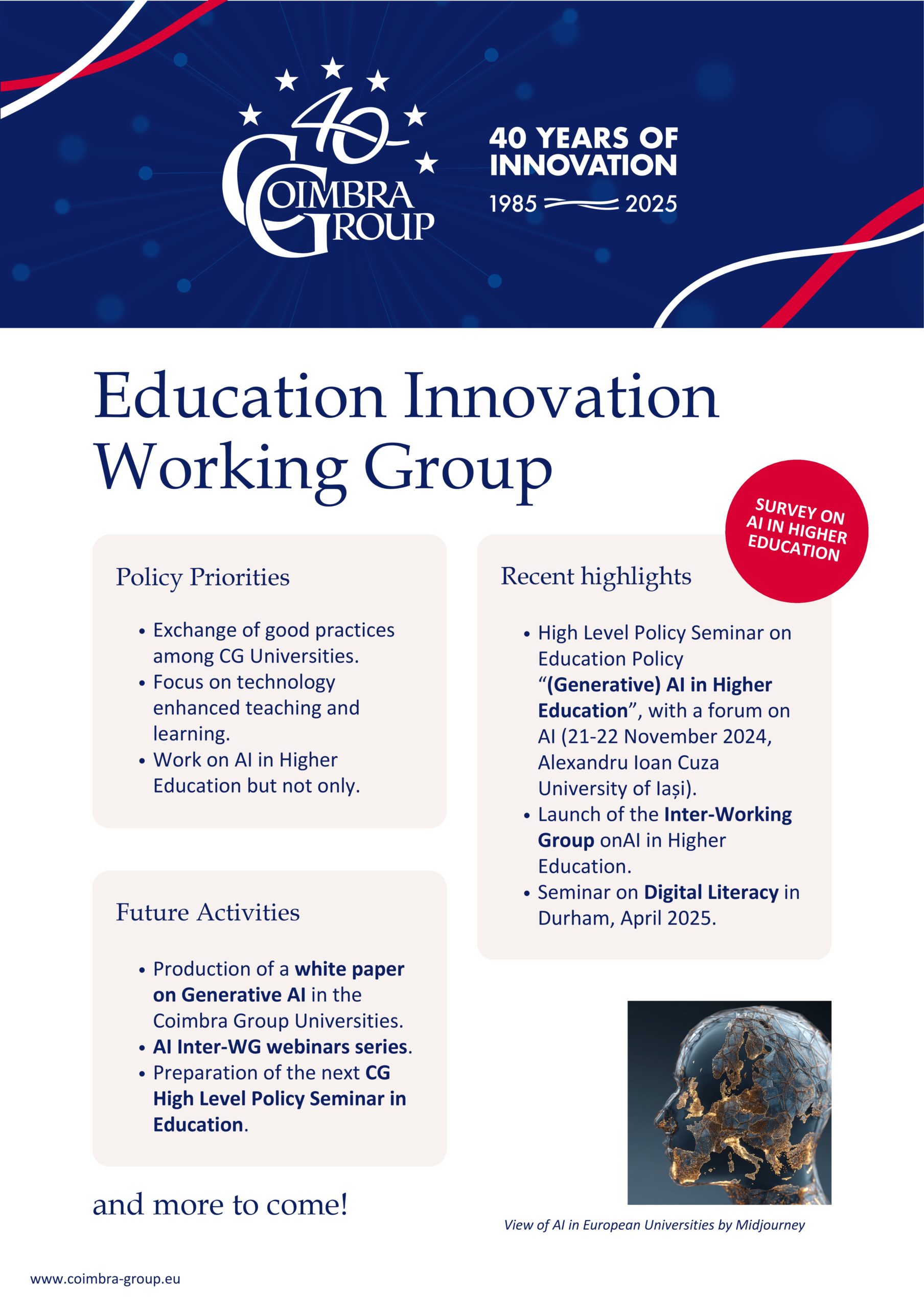
Science, Technology, Engineering and Mathematics
Working Group
Chair: Francesco De Anna

Francesco De Anna is a lecturer of the Institute of Mathematics at the University of Würzburg. He completed his PhD at the University of Bordeaux in 2016, working under the guidance of Marius Paicu. His doctoral research centered around the dynamics of complex fluids. Subsequently, he spent two years at Penn State University, during which time he held the position of Chowla Research Assistant Professor. His focus there revolved around collaborative work with Chun Liu, delving into variational theories related to liquid crystals. In 2018, Francesco De Anna moved to Würzburg, embarking on an independent and innovative research path. His primary research revolves around the derivation and analysis of nonlinear partial differential equations. These equations serve as foundational models for capturing the intricate dynamics of certain anisotropic fluids. The underlying analysis draws upon a diverse spectrum of methodologies, notably techniques from functional analysis, harmonic analysis and Fourier analysis.
Vice-Chair: Giulia Marina Licini

Giulia Licini is professor of Organic Chemistry at the University of Padova (Italy). She got her PhD in Chemical Sciences at the University of Padova. After one-year postdoc at the Colorado State University, Fort Collins, CO, USA, she moved back to the University of Padova where she is now full professor. At the University of Padova she has been part of several committees related to student tutoring, PhD studies, internationalization and teaching assessment. She is also active in the frame of the Italian Chemical Society activities. She has been chair/co-chair of international conferences and schools.
Her main research activities are related to homogeneous catalysis and molecular recognition for biomimetic processes and sustainable biomass valorization. She has been/is supervisor of PhD and master students, also in cotutelle. She is co-author of more than 100 publications in peer-reviewed journals and has been invited as speaker at national and international conferences and schools. She has been involved in several national/European projects also with industrial partners.
Working Group Focus
Science, Technology, Engineering and Mathematics (in this established acronym-friendly order) have benefited, over the centuries and still today, from fundamental contributions of scholars from universities which are now members of the Coimbra Group. STEM remains a major factor of modernization and progress for society at large. As research-intensive universities, the members of the Coimbra Group are firmly committed to and constantly develop and expand their research and education in STEM, also including societal outreach related to these fields.
Priorities for 2025-2026
- Research assessment in STEM disciplines: The new principles promoted by the Coalition for Advancing Research Assessment (CoARA), of which CG and several of its members are members, is likely to transform the way research will be evaluated and funded in the coming years. These changes will influence the future recruitments and promotions of researchers and academics in the EU. It is important to share the good practices in STEM disciplines that are and will be implemented by CG universities to increase the quality of research, to promote scientific integrity and engagement with society. This reform will change the way quantitative indicators will be considered, including the use of h-index, citations and journal impact factor. We aim to gather information and host in UCLouvain on 20 November 2025 a one-day conference where experts will discuss the key innovations and future trends in research assessment.
- New teaching & learning methodologies in STEM: STEM disciplines suffer from of a low number of new students, as well as a significant drop-out. Innovation and new teaching methodologies in STEM (active learning) can help counter this trend by facilitating students’ learning experiences. We want to establish and discuss which innovative and active learning activities are carried out at local level of each CG Universities in STEM disciplines. Additionally, significant attention will be given to exploring the integration of teaching methodologies with the advent of artificial intelligence, examining both the positive and negative impacts on students. Following the Fall 2024 workshop in Padova, we plan to hold another open discussion meeting about active teaching methods in the Spring 2026.
- Women in STEM: There is a chronically low presence of women in STEM fields at all levels, in particular at PhD, post-docs and academic level. We will carry out an analysis (on-line surveys, interviews) at Master, PhD, post-docs levels to gain information on which are the expectations and main difficulties of early-stage female-researchers in STEM fields. There are possibilities for carrying out this project also at inter-WG level (Doctoral Studies and Equality and Diversity WGs). Furthermore, we want to collect testimonials from STEM female-researchers as positive and successful models (interviews).
- Good practices in science communication: Effective initiatives to encourage and attract young people and in particular girls to STEM fields are of fundamental importance. We want to establish which activities are carried out in the STEM WG Universities to facilitate the entry in STEM studies of young people (national and local projects), paying particular attention to actions for gender balance. Eventually, the analysis will be expanded to all CG Universities.
Recent highlights since June 2024
- New teaching & learning methodologies in STEM: On 14 November 2024, the STEM WG held a one-day in-person workshop at the University of Padova focused on teaching methodologies, in collaboration with the Teaching4Learning project, and with support from the Coimbra Group WGs Funding Scheme.
Ongoing / forthcoming activities 2025-2026
- Research assessment in STEM disciplines: A workshop is planned on 20 November 2025 at UCLouvain to explore the implications of emerging approaches to research assessment. The event will feature expert discussions on proposals developed by CoARA and related initiatives.
- New teaching & learning methodologies in STEM: During 2025, the STEM Working Group plans to continue the discussion with online contributions from the partners related to active learning in the different University and STEM fields, also, in collaboration with a programme at the University of Padova dedicated to teaching innovation.
- Activities at the Organisational Stage:
- Women in STEM: analysis (on-line surveys, interviews) at Master, PhD, post-docs levels to gain information on which are the expectations and main difficulties of early-stage female-researchers in STEM fields. Preparation of the survey, distribution of the questionnaires, data analysis, preparation of the report.
- Promoting academic cooperation in STEM programmes: organization of a one day-workshop on academic cooperation in STEM fields and in the different realities of the CG Universities (back-to-back with a STEM WG meeting).
Contact person at the CG Office: Rúben Castro (castro@coimbra-group.eu)
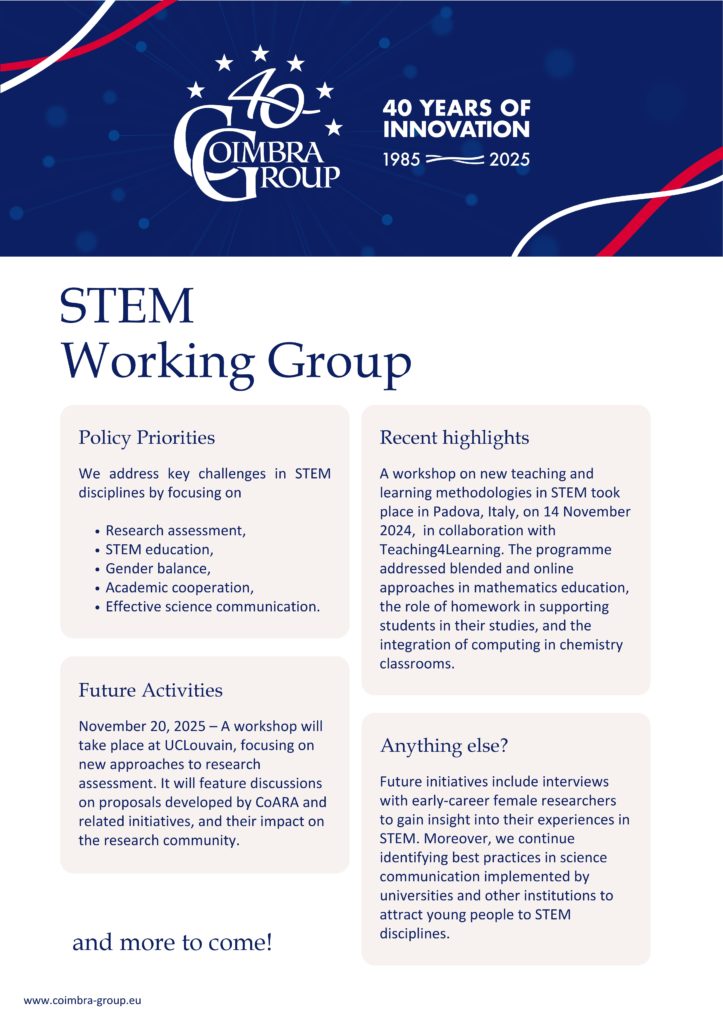
Employability
Working Group
Chair: Orla Bannon
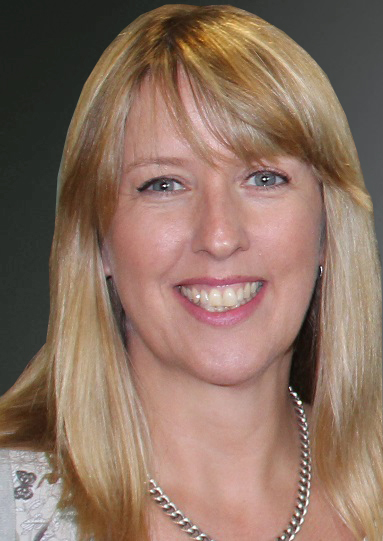
Orla Bannon is the Director of Careers at Trinity College Dublin. She has responsibility for managing the scale and quality of academic and student engagement with careers, as well as partnerships with employers, to deliver a truly world-class careers service at Trinity. She provides leadership to the Careers Team, promotes the value of the Careers Service across the University, and acts as a centre of expertise, advising and contributing to the University’s objectives in terms of employability and skills development, and the wider student experience.
Orla holds a degree in Biochemistry from Trinity, an MBA from UCD/RCSI and a Diploma in Personnel Management (NCI). She has over 25 years of management experience in both the public and private sectors in areas such as healthcare, higher education, IT and publishing.
Vice-Chair: Annette Retsch
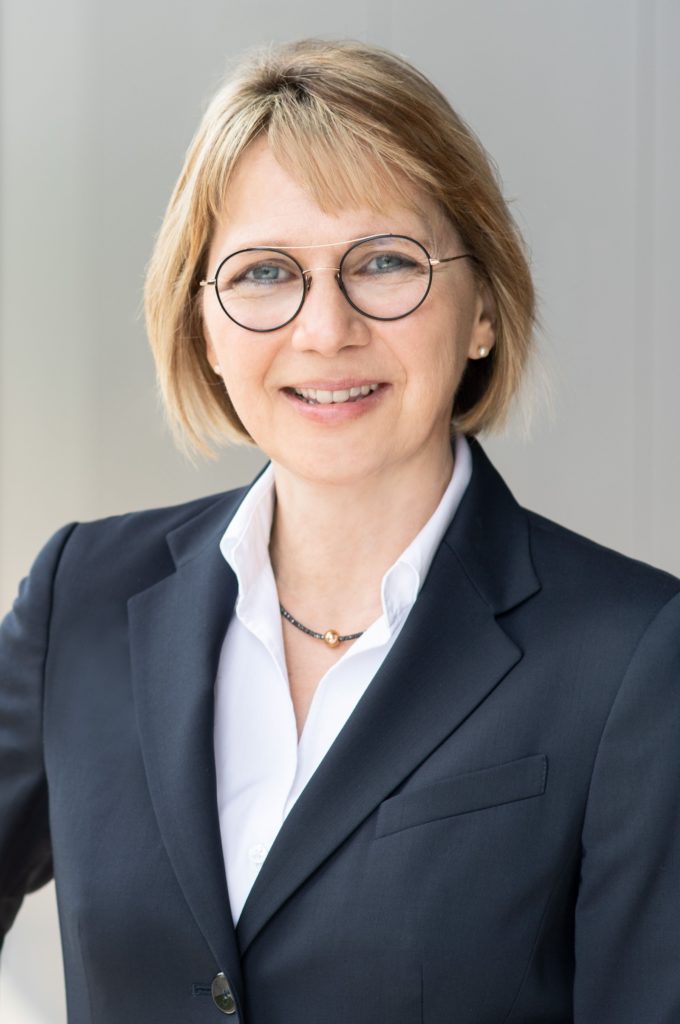
Annette Retsch is head of the Career Centre at the University of Würzburg since its inception in 2007. Her responsibilities include the strategic direction of the development, planning, evaluation of about 100 transversal skills workshops and lectures every year. She specialises in individual career consulting and methods for sustainable professional development. Furthermore, she was responsible for the conceptual development of an individualised Virtual Exchange Program and allowing its embedding in curricula.
Prior to her commitment to employability activities, she graduated in German and English Studies with the state examination for the teaching profession at secondary schools and completed her PhD thesis in German and English linguistics on paratextual elements in German literature.
Working Group Focus
We are living in fast-paced, dynamic, and uncertain times where economic, societal, environmental and global needs are rapidly changing and where a highly skilled adaptable workforce is essential. A strong knowledge economy needs opportunities for lifelong skills development, which matches the skills needs of employers, both now and in the future. These skills allow for new value creation and problem solving addressing the challenges of our time. Continuous innovation and agility in higher education and research is required to futureproof the graduate pipeline with the skills that will allow society and industry to flourish and grow sustainably.
Enhancing students’ employability to meet the rapidly evolving needs of learners, society and industry is now a core part of a higher education institution’s objectives. In this context, the collaboration and exchange of experiences within the EmployabilityWG of the Coimbra Group aims to:
- Improve the visibility and recognition of the value of careers and employability services across Coimbra Group universities.
- Increase joint collaborative projects on how career services are organised, deliver their services, and support their universities (professionalisation of career services).
- Prepare students for the 21st century global labour market and lifelong learning through the acquisition of key future skills.
- Explore how Coimbra Group universities can support initiatives under the EU’s Union of Skills.
- Develop careers and employability initiatives to support Coimbra Group’s Durham Declaration on Climate Change and Sustainability.
We are an active Working Group which constantly seeks to identify new areas for conjoint work, to explore common issues and challenges across our universities, to share our learnings and drive innovation for the enhancement of our services for the benefit of our students.
Priorities for 2025-2026
- Increase our awareness and understanding of micro-credentials and the opportunities they present for careers, employability, and skills development within Coimbra Group universities.
- Drive understanding of key future skills and labour market trends across careers and academic staff and how we can support students to build their capability in key skills areas.
- Explore how to improve student engagement with careers and employability services and ensure that our services remain relevant to students and meet their evolving needs
- Explore how AI can influence and enhance our service delivery and how we work.
- Increase awareness of the value and relevance of careers and employability services in Coimbra Group universities through publications, workshops, and increased collaboration with other Coimbra Group Working Groups.
Recent highlights since June 2024
- Response to the European Commission’s Call for Evidence for an EU Quality Jobs Roadmap.
- Publication of a position paper on AI and Digital Competence through Higher Education.Completion of the WG Situational Analysis Report on employability and careers services across Coimbra Group universities for publication in Q2 2025.
- Research overview and recommendations on Skills for the Future of Work.
- Delivery of a successful professional training workshop on Future Skills on 27 and 28 November 2024 at Trinity College Dublin, attended by 16 CG universities, with support from the Coimbra Group WGs Funding Scheme
- EMP WG member (Katrine Moland Hansen, University of Bergen) selected as Co-Coordinator of CG inter-WG cooperation on AI.
- Establishment of two new subgroups and development of detailed plans to:
- improve student engagement with our services (Student Engagement Subgroup).
- explore how AI can influence and enhance our service delivery and how we work (AI Subgroup).
Ongoing/forthcoming activities 2025-2026
- Plan a joint workshop focussing on careers and employability services support for PhD students in collaboration with the Doctoral Studies Working Group.
- Develop a Future Skills toolbox of resources, materials, and guides for use in training sessions with students to include green and digital skills.
- Map involvement and experiences on micro-credentials across Employability WG members including recommendations for the future.
- Develop new strategies / exchange practices on supporting students with disabilities.
- Development of a good practice framework for Career Services for working with academics and supporting academic-enterprise engagement, e.g., work-based learning.
- Advance work of the Student Engagement and AI Subgroups to deliver on planned objectives.
- Collaborate with the Academic Exchange and Mobility WG to clearly identify and articulate the skills that can be gained through exchange and how these contribute to students’ employability.
- Develop strategies / exchange practices on supporting international students to transition into national and European labour markets.
Contact person at the CG Office: Ester Zangrandi (zangrandi@coimbra-group.eu)
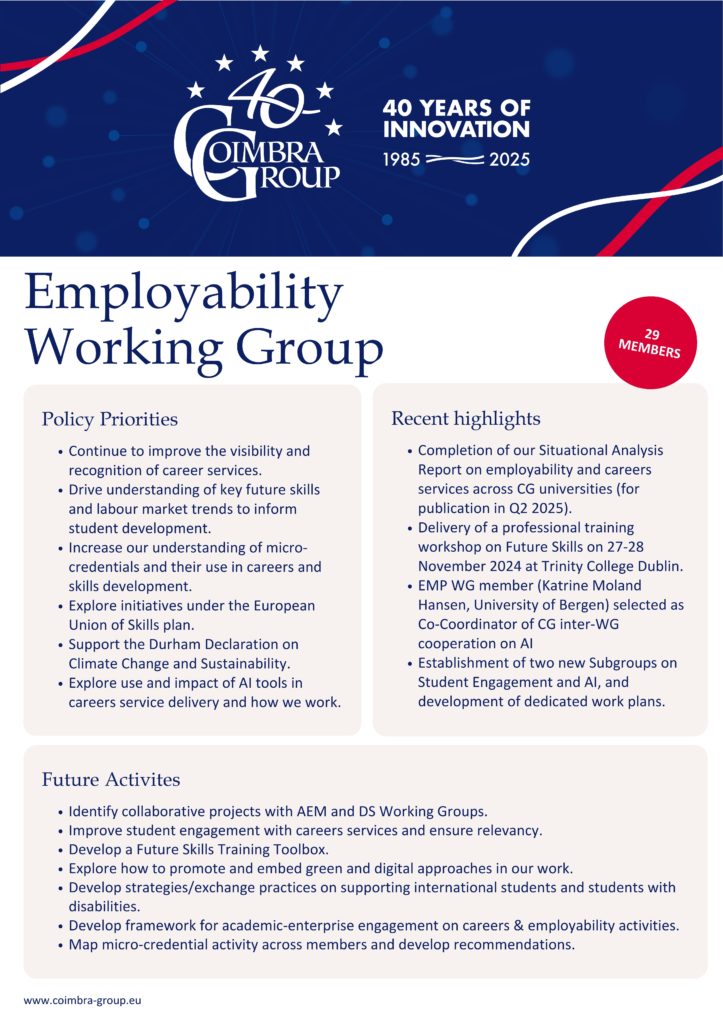
Social Sciences & Humanities
Working Group
Chair: Ilaria Poggiolini

Ilaria Poggiolini is Chair Professor of International History and former Pro-Chancellor for International Relations at the University of Pavia. She is a member of the teaching staff of the University’s Doctorate Programme in History and of the Committee for the publication of Italian Diplomatic Documents (Italian MFA, Rome) and Associate of Italian Studies at Oxford. She is WP Co-Leader for the EC2U Aliance. She has recently published a book reassessing the history of Britain in and out of the EC/EU. She teaches in Italian and in English: History of International Relations, European integration and Public Diplomacy.
Vice Chair: Balázs Apor
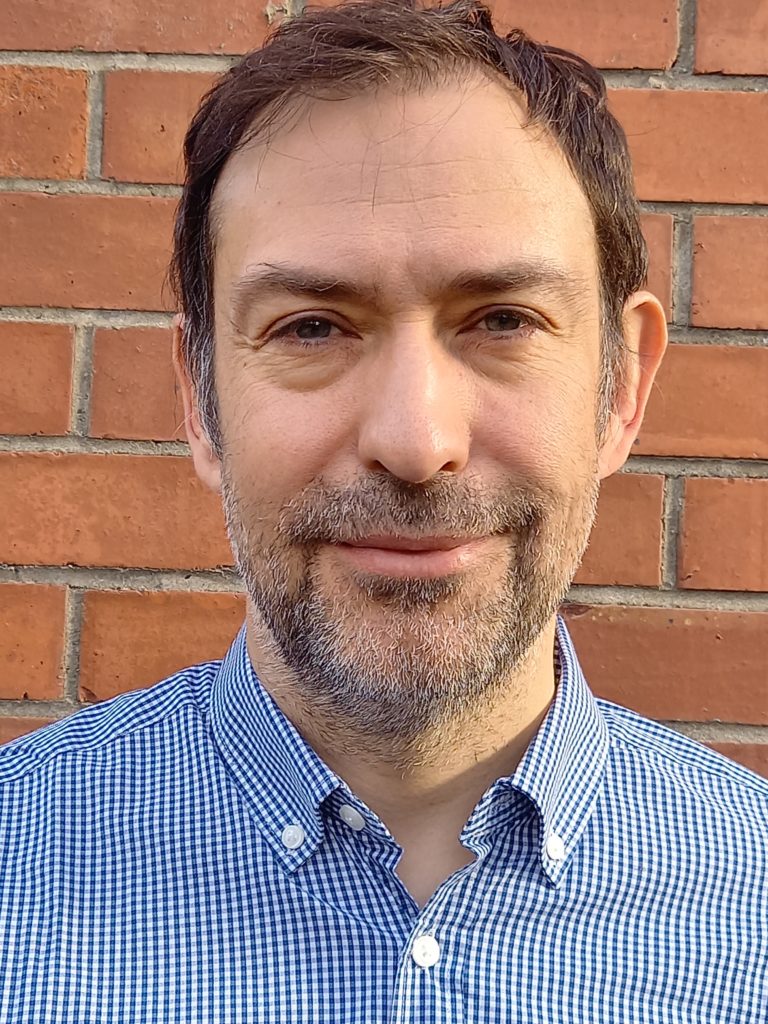
Dr Balázs Apor is associate professor in European Studies in the School of Languages, Literatures and Cultural Studies at Trinity College Dublin. His research interests include the Sovietisation of Eastern Europe after World War II and the cultic veneration of communist leaders. Most recently, his work focuses on the legacies of communism and cultural forms of opposition in post-communist Hungary. He is founder and Director of the Trinity Centre for Resistance Studies at Trinity College Dublin.
Working Group Focus
The Coimbra Group Social Sciences and Humanities (SSH) Working Group (WG) will continue its focus on tasks and activities related to research and education, as well as outreach and visibility. Its primary objective will be to support the SSH research initiatives of member universities. To achieve this, the WG will organize seminars and conferences and, building on the insights gained from these events, the WG aims to develop successful research proposals for international funding bodies, such as EU funding bodies. Previously, the multidisciplinary requirements of EU calls have posed challenges for SSH scholars. Therefore, the WG will emphasize a multidisciplinary research approach and highlight the collaborative nature of SSH to tackle this issue.
Additionally, the WG will disseminate information on timely research funding opportunities across member universities and participate in the CoARA (Coalition for Advancing Research Assessment Agreement on Reforming Research Assessment) Working Group “Evaluating SSH research globally”.
Thirdly, the SSH WG will serve as an overarching and coordinating structure in the research and educational domains of SSH within the framework of the European Universities Alliances Initiative. Consequently, the WG will act as a liaison between different working groups (self-steering committees/virtual institutes, etc.) from Alliances associated with the Coimbra Group.
Priorities for 2025-2026
- The SSH WG will soon see a change in leadership, consequently to the organisation of Chair elections at the next WG meeting scheduled on 10 June 2025 at the University of Bologna, at the CG 2025 Annual Conference. The WG priorities for 2025-2026 shall therefore be discussed, updated and agreed among WG members on that occasion.
- The current priorities are as follows:
- Organising at least one international conference and publishing the proceedings.
- Looking into general themes and specific calls in which SSH research undertaken at CG Universities might find success. Prior work on funding proposals has been conducted, in connection to meetings and conferences.
- Exploring, mapping and planning future inter-European University Alliances activities.
- Stressing the role of SSH for postgraduate and doctoral education and increase our levels of collaboration with other CG representatives at the home universities, if possible via Blended Intensive Programmes (BIPs). We will use BIPs for intra-CG cooperation on postgrad and doctoral levels.
Recent highlights since June 2024
- Call for papers (link) and organisation of Inter- European Universities Alliances Conference “Debating Transnational Solidarity. Multidisciplinary interpretations and projections on future scenarios“, 19-20 March 2025, University of Pavia.
- Call for papers (link) and organisation of International Conference “Old Cities, Former Capitals and the Nation-State Building in Europe (18th-20th centuries): regional and national identities”, 19-21 November 2024, Alexandru Ioan Cuza” University of Iași.
- Call for Papers on “AI currents and European Universities” (link), September 2024.
Ongoing/forthcoming activities 2025-2026
- The SSH WG will soon see a change in leadership, consequently to the organisation of Chair elections at the next WG meeting scheduled on 10 June 2025. The WG activities for 2025-2026 shall therefore be discussed, updated and agreed among WG members on that occasion. The current planned activities are as follows:
- Participation in the CoARA WG “Evaluating SSH research globally”.
- SSH conference “Thinking between/beyond languages” (Fall 2025, host university tbd).
- Conference “Concept of solidarity in Europe – a transdisciplinary approach” (Fall 2025 or Spring 2026, University of Pavia).
Contact person at the CG Office: Emmanuelle Gardan (gardan@coimbra-group.eu)
